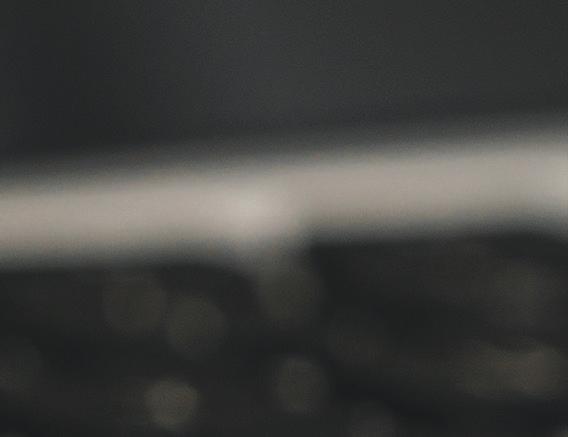



































































Published by: Ashville Media Group, Unit 55 Park West Road, Park West Industrial Park, D12 X9F9



Tel: +353 1 432 2200


Email: info@ashville.com Web: www.ashville.com









On behalf of: Chambers Ireland, 11 St. Stephen’s Green, Dublin 2, D02 FY84



Tel: +353 1 400 4300






Email: info@chambers.ie Web: www.chambers.ie

















All articles © Ashville Media Group 2022. No part of this publication may be reproduced, stored in a retrieval system or transmitted in any form or by any means without written permission from the publisher. Opinion and comments expressed herein are not necessarily those of Ashville Media or Chambers Ireland. ISSN 20093934















































“Making a significant investment decision can be di icult when costs are rising, but we are committed to helping Irish SMEs overcome these challenges.”







With locations in Cork, London and Sydney, property operations software provider CIM has closed a Series A funding round of AU$10m. The brainchild of Irish software engineer David Walsh, CIM’s solution enables teams to work more collaboratively and accelerates the journey to net-zero emissions. CIM currently employs a total of 59 people, with 41 based in Australia and 14 in Ireland. The company plans to expand into Asia and North America and double its headcount in the next 12 months. “CIM makes it easy for operations teams to manage large buildings at their peak performance and deliver significant economic and environmental benefits,” said Walsh.

















More than 95% of US multinationals have a positive view of Ireland as an investment location, according to a survey of American Chamber of Commerce Ireland members.
A Typetec survey of 200 SME owners in Ireland has revealed that one third have paid ransoms to cybercriminals, down from 52% in 2021.









Global IT systems integrator Rahi is setting up a new integration and warehousing facility in Ballycoolin, Co Dublin to support its growing Irish and European data centre business. Rahi’s European sales headquarters have been in Limerick since 2015 and it is hiring 25 people for the Ballycoolin expansion. Founded in 2012 in the US, Rahi employs over 1,200 people worldwide, with almost 100 of these in the Irish and European regions. VP and General Manager of Rahi Europe Marcus Doran said: “The concept of the data centre has evolved to encompass diverse and sustainable environments along with traditional on-premises infrastructure, cloud platforms, co-location facilities and edge data centres. Our Irish team will play a pivotal role in creating industry-leading technological solutions for our customers.”

Engineering consultancy EDC has opened a new o ice in Istanbul, Turkey, to meet client demand and leverage opportunities in the MENAT region. Established in 2003 in Cork, EDC has already opened an o ice to service the Mid-West of Ireland, appointed two executive directors in its Cork and Dublin o ices; and increased headcount to over 85 employees across its five o ices over the past 24 months. Richard O’Farrell, Managing Director of EDC, said: “EDC is looking to further grow our engineering and consultancy services, and the strategic decision to expand to Istanbul strengthens our delivery capabilities and increases our ability to service our current and future clients and sectors.”

The
A DataSolutions survey reveals that while 78% of tech companies have plans to achieve carbon neutrality, 65% have not yet measured their carbon footprint.
A Mason Hayes & Curran survey shows that 85%
Last year funding into female-founded start-ups surged 120% to reach a record €230m, according to a TechIreland report published to coincide with International Women’s Day.


New data published by Comreg has revealed that fibre-to-the-premises technology in the Irish market is now on a par with cable broadband subscribers for the first time.

Cadbury Dairy Milk, Tayto and An Post are the top three ‘emotionally connected’ brands in Ireland, Red C survey shows.
Dublin-founded gig economy platform Gigable is partnering with UK embedded-finance specialist Weavr. With over 34,000 members, Gigable is a decentralised marketplace where businesses and gig workers can connect; post, accept shifts, invoice and be paid. The partnership with Weavr aims to reduce the time that gig workers in the UK and Ireland wait to get paid while also allowing them to control their finances in real time. CEO John Ryan founded Gigable in 2018. He said: “An increasing number of people are turning to the gig economy as a result of their income no longer covering their expenses. This partnership supports our mission of being a freelancer-first platform.”
Irish agency Granite Digital has entered into a new partnership with WP Engine, forecasting €3.1m in additional revenues for 2023 as a result. It will strengthen Granite’s enterprise offerings, enabling it to grow its client portfolio across Ireland and the UK. The global leader in WordPress technology, WP Engine hosts 1.5 million websites in over 150 countries. Through the partnership, Granite expects to fully migrate around 200 customers to WordPress by the end of 2023. “WordPress is growing at an incredible pace with more than two out of every five websites now powered by its technology. We have identified significant opportunities with WP Engine in the enterprise sector,” said Robert Carpenter, Founder & Partner of Granite Digital.

Cork-based company Getvisibility is ramping up its global expansion with the opening of a new San Francisco office. It has developed a platform powered by artificial intelligence for data discovery, classification, security and governance. Having already secured major contracts with large enterprises in the US, Getvisibility plans to grow its teams in both the US and the EMEA region. “When you consider that IBM reports the average cost of a data breach in the US as being US$9.44m, action is clearly needed. We are investing in our team, offering and presence to meet this growing demand in the US and across other markets,” said Jacinta Tobin, recently appointed COO of Getvisibility, who will lead operations in San Francisco.

Workwear manufacturer Portwest has acquired another Mayo-based company in its sector, Westaro Hosing, in a multimillion-euro deal. It follows three global acquisitions by Portwest, which is one of the fastest-growing workwear companies in the world. Currently employing around 5,100 people, it has sales in over 130 countries, warehousing facilities in Ireland, the UK, Poland, Dubai, Australia and the US and four factories in Asia and Africa. Established in 1988, Westaro holds a strong position in Ireland and employs 20 people. “Acquisition of market-leading workwear and safety companies is a key part of the Portwest group’s global growth strategy,” said Portwest Head of Corporate Finance Helen Noud. This is the first time the company has secured this type of deal within the Irish market.




Irish Distillers is to invest €250m in building a new distillery in Midleton, Co Cork to meet demand and ensure the necessary future production capacity for its portfolio of Irish whiskeys globally. Situated on a 55-acre site adjacent to the existing Midleton Distillery, the new carbonneutral operation will produce Irish whiskeys including Jameson, Powers, Redbreast, the Spot family and Method and Madness. The move is expected to create up to 100 new highly-skilled jobs for the region over time once the distillery is operational in 2025 and around 800 jobs during the construction phase.


Taoiseach Micheál Martin o icially opened the new Penneys store in Tallaght, Dublin, in September. Located on the ground floor of The Square shopping centre, it has 43,000 sq ft of retail space and has created 300 jobs. The €10m investment represents the first new Penneys store in Dublin for six years and its 37th in the country. Parent company Primark, founded in 1969, now operates in 14 countries and employs 70,000 people. An Taoiseach said: “Penneys is at the centre of Irish and international retail and its success proves how valued the brand is in our lives in Ireland. The jobs announced are testament to Primark’s strength and continued growth.”




We’ve got you. While your focus is on your business, ours is on helping you. Working with one of our business partners will provide you with specialist knowledge that covers your corporate and investment needs; whatever the business, opportunity, or situation.
Grow your business today.
Allied


Bank of Ireland’s Savings and Investment Index dropped to 87 in August from 90 in May. In May 2020, the index for a ‘Good time to save’ reached a high of 117 but had dropped to 92 by August 2022. When asked whether it will be a good time to save in six months that score drops to 85, the second-lowest level since 2019. “The impact of rising prices is possibly the most significant in the past three years in terms of how people view saving and investing,” said Kevin Quinn, Chief Investment Strategist at Bank of Ireland.
“Despite emerging out of a once-in-a-generation disruption to working patterns, four in 10 companies don’t have a health and wellbeing strategy. is falls to 38% for mental health strategy. Our research shows a clear decline in employee mental health and employers need to take urgent action to provide supports tailored to their needs. New for 2022 is the need to introduce speci c nancial wellbeing supports to help retain and attract top talent. e role of the o ce is changing too, becoming more a shared space to re-establish social connections that employees are clearly missing out on.”
Sinead Proos, Head of Health & Wellbeing, Laya Healthcare, on the release of its Workplace Wellbeing Index, which shows that 85% of employees have experienced anxiety in the past ve months.








The ‘Estimation of Costs of Doing Business in the Hospitality Sector: 2022 and 2023’ report commissioned by the Drinks Industry Group of Ireland has revealed that energy-price increases for businesses have exceeded household increases in many cases. Non-household electricity prices in Ireland were found to be 60% higher than the EU average in the second half of 2021, with business gas users experiencing rises of more than double those of households. In the hospitality sector, the price of electricity increased by 40% in July 2022 compared to July 2021 and gas increased by 60.2% in July 2022 compared with a year earlier.


















































TechIreland’s H1 2022 Funding Review shows that 91 startups raised this amount between them in the first half of the year.

Enterprise Ireland has been named as Europe’s most active domestic venture capital (VC) investor by deal count in a new report by VC and private equity investment platform PitchBook. Covering the period from 2018 to the first half of 2022, the report showed that Enterprise Ireland had completed 988 investments, the most in any European country. The number of investments completed by Enterprise Ireland was 42% more than its nearest competitor, French sovereign wealth fund Bpifrance.
How have you funded the business to date?
In the early days, we received funding from Enterprise Ireland and were supported by NovaUCD. We recently did a round for over €1m in funding led by Elkstone
What’s the best advice you have been
Keep it simple. Everybody has an opinion and it’s hard to get people to listen. Also when it comes
what is simple is easier to
What was the most important lesson you learned starting
Never take no for an answer. If you are persistent and have the grit to ‘get to yes’ with investors, first customers and new hires, you turn impossible into inevitable.
Your biggest make or break
When Covid-19 hit our pipeline of deals disappeared. We decided to launch into Australia and New Zealand as they
Covid-19 di erently, and these are now our
Is there anything you would change in
As a joke,
don’t
used
“Don’t believe the
Company: Allsorter.com,
Location:
Product:
they’ll add
months
eCommerce growth financing business Wayflyer has been named as the top Irish startup on LinkedIn’s 2022 Top Startups List for Ireland, which recognises the top ten most sought-after start-ups to work for in the country. The list reflects the Irish companies that have embraced innovation and the future of work, and spotlights start-ups successfully navigating the evolution of consumer and business needs. Based in Dublin and employing 250 people, Wayflyer achieved unicorn status earlier this year after its Series B funding round and has since gone on to raise US$253m in debt financing from Credit Suisse.
Galway-based hybrid workplace management platform Ronspot has raised €1.1m in an investment round led by Furthr VC and including funding from the Halo Business Angel Network and Enterprise Ireland. Founded in 2018, Ronspot is a three-in-one space management platform designed to make hybrid working easy while also supporting e iciency in the workplace. Now with over 200 customers in more than 30 countries, Ronspot will increase its workforce from 18 to 28 people in the next 18 months and aims to establish a physical presence in Germany, France, Italy and Spain. “Great companies can be born out of uncertain times and Ronspot is an example of this,” said Richard Watson, Managing Partner, Furthr VC.







Healthtech start-up xWave Technologies has closed an over-subscribed €1.3m seed funding round led by a number of private investors, including €250,000 from Enterprise Ireland. In 2021, the company launched xRefer, a smart radiology referral platform that uses market-leading evidence to support clinicians in ordering the most appropriate radiology scan for their patients. “The data that we have already seen from the use of xRefer in the Irish healthcare system indicates we can potentially eliminate radiology waiting lists by removing unnecessary tests and ensuring that patients get the best test first,” said Mitchell O’Gorman, CEO, xWave Technologies. “This funding will enable xWave to capitalise on commercial opportunities that we now have in the Irish, UK, and Northern European markets.”
One of the featured start-ups at the World Agri-tech Innovation Summit in London recently, Proveye is pioneering the use of digital image data for both agriculture and environment protection.
The University College Dublin spin-out’s grassland management platform integrates unmanned aerial vehicles, satellites and artificial intelligence technology into a single platform that represents a higher level of accuracy and clarity in grassland mapping. In September, Proveye was awarded €225,000 in funding from the European Space Agency, which it will use to support the commercialisation of its platform. It is also validating the technology in Ireland, Europe and New Zealand through pilot field trials.
“Our technology has the potential to revolutionise grass management not only for the dairy and beef sectors, but also for industries like renewable energy production and grass-based biorefining,” said Professor Nick Holden, Co-founder, Proveye.






NEW TITLE: Country Managing Director for Ireland


EMPLOYER: Accenture
PREVIOUS ROLE: Director of Operations, Accenture UK & Ireland
Accenture has named Hilary O’Meara as Country Managing Director for Ireland, e ective from 1 January, 2023. Taking over the role from Alastair Blair who will retire from Accenture in early 2023, O’Meara has been with Accenture for almost 30 years. During this time she has led its Strategy & Consulting, Resources and Technology practices.
NEW TITLE: Chief Executive O icer

EMPLOYER: AXA Insurance

PREVIOUS ROLE: Retail Director, AXA








AXA Insurance has confirmed that Marguerite Brosnan will succeed Philip Bradley as Chief Executive O icer of its operations in the Republic of Ireland from 1 January, 2023. Brosnan joined AXA in 2020 after a 20-year career with Bank of Ireland, where she held a variety of senior sales and operations roles, including as Managing Director of Bank of Ireland Insurance.


NEW TITLE: Chief Information O icer
EMPLOYER: Sidero
PREVIOUS ROLE: Agile Manager, Sidero

NEW TITLE: Managing Director
EMPLOYER: Irish Pensions & Finance
PREVIOUS ROLE: COO, Irish Pensions & Finance


Tech Excellence’s Company of the Year 2022, Athlone-based Sidero, has announced the promotion of David Dolan to the position of Chief Information O icer. With almost 20 years’ experience in web, cloud, software engineering and digital transformation, Dolan joined Sidero in 2019. Previously, he was IT Operations Manager at MyHome.ie for nine years.
Irish Pensions & Finance (IPF), which provides retirement and financial planning to over 24,000 clients with managed funds valued in excess of €600m, has appointed Claire Hanrahan as Managing Director. Hanrahan joined IPF in 2005 and progressed to become a Partner and Chief Operations O icer of the Co Meath firm in 2016. She previously held roles at Zurich and VHI.
Irish charity WorkEqual appeared before the Joint Oireachtas Committee on Gender Equality on 6 October. “A public awareness campaign is needed to build understanding of the factors that cause the pay gap and why it is important to address it. This will ensure full buy-in and long-term support for the Gender Pay Gap Information Act,” said Sonya Lennon, Founder of WorkEqual, which provides free supports to women entering or re-entering the workforce. “We would also like to see workplaces proactively involving their male employees – at all levels – in gender equality actions.”










































































































































































Selected as Ireland’s Most Trusted Leader by Great Places to Work this year and an EY Entrepreneur of the Year 2022 finalist, Cathal Fay, CEO and Co-founder of PrepayPower, believes its service will become attractive to a larger cohort of people due to the energy crisis.



Q: Have you always had a business head on your shoulders?

























Cathal Fay (CF): I started out my career in the 1990s in Eircom, which was very much a large semi-State company at the time. I learnt lots during my time there. However, I found it a little slow moving and lacking in autonomy for me. When an opportunity came up to leave to start a business in e-books and mobile productivity so ware I said yes immediately. is was back in 2000 in the days before smartphones and the so ware that we developed was for pocket computers (Psion Organisers).
We were too early to the market and unfortunately the business was unsuccessful. However, I was bitten by the
According to Co-founder and CEO of PrepayPower Cathal Fay, its role in the current environment is to help customers to cope in a number of ways: “Through our meter or app we provide them with the information on how much they’re spending. This means that rather than facing the shock of a big bill every two months, they are in the know from day to day on their electricity costs. In this environment with increases coming thick and fast customers may not even be aware that their tariff has been increased by their supplier if they are on a bill-pay system,” he says.
“PrePayPower allows customers to break down payments into smaller amounts to pay when it suits them rather than being faced with a single payment. We also use our hedging to help save our customers from the worst of the price volatility. At the moment we have the lowest standard rate equivalent annual bill for electricity.”
friends and family to prove our business model with a trial in Tallaght in 2011. The response rates to our advertising were off the charts. Sales continued to roll in through customer recommendations when we didn’t have enough money to advertise.
The next step was to raise sufficient funding to be able to drive the business to grow to its potential. It took us 11 months to find the right investors for us. Eventually we brought in two tremendous investors in Ulric Kenny, Co-founder of Ion Equity, and serial tech entrepreneur Andrew Collins. They brought not just capital but wonderful experience to the business and have been instrumental in helping me to drive it. With annual turnover of around €200m, PrepayPower now has just over 170,000 electricity customers, together with 60,000 gas customers and – uniquely in Ireland – 15,000 pay-as-you-go broadband customers.
Q: What is the secret to the success of PrepayPower?
CF: We put customers in control by providing them with information on how much electricity they’re using so that they can reduce consumption and save. The average customer reduces their usage by over 8% per annum when they join us. We back this with great customer service. We are the top-ranked supplier in Ireland on TrustPilot based on our customer reviews.
Our great team of 350 people work together to drive the success of the business. We use the Great Places to Work model to get the pulse of the organisation and we always rank well, particularly with all team members being clear on their purpose.
We have a variety of different skillsets across a range of areas from sales, customer experience, finance and software development to hedging. Our hedging expertise has helped us to manage the rising electricity and gas wholesale markets more effectively than competitors.
start-up bug and wanted to continue. I moved into mobile content (ringtones, graphics and games) with Red Circle. I led this business to become the largest provider of ringtones in the UK, growing its revenues from €5m to €25m within three years. The business was sold to Zamano in 2007 in a €24.4m deal. After that exit, I was approached by a former colleague in 2010 to join a start-up in the prepaid electricity space and jumped at the chance. At that point PrepayPower was born. This was the first time in Ireland that customers could choose a prepaid electricity service.
Q: How did you grow and develop the business?
CF: We started off in 2010 above a second-hand bookshop in Blackrock in Dublin. At that time we had no customers and no revenues. With my experience in marketing and operations from Red Circle we used our limited funding which we had raised from
Q: Any other news or future plans you can share?
CF: We are approaching 250,000 customer accounts. This is a combination of 173,000 electricity accounts, 61,000 gas accounts and 16,000 broadband accounts. This will be a great team celebration where we all get together to reflect on our continued growth.
We are about to launch a feature in our app to allow customers to put some money aside in summer months to help deal with the increase in energy costs in winter. In the longer term we plan on continuing to grow our offering by providing more energy services to customers to help them move their demand to times when energy is cheaper and greener.

“We put customers in control by providing them with information on how much electricity they’re using so that they can reduce consumption and save.”
COMPANY: EnerMech
SECTOR: Engineering services
LOCATION: Athlone
ANNOUNCEMENT: Integrated solutions specialist EnerMech has o icially opened its first facility in Ireland, in Athlone, Co Westmeath, which will create around 170 jobs over the next three years. The new roles will be across a range of specialist engineering disciplines.
COMPANY: Channel Mechanics SECTOR: Technology LOCATION: Galway
ANNOUNCEMENT:
SaaS partner relationship management and channel programme automation provider Channel Mechanics plans to create an additional 50 positions over the next 12 months with the opening of its new global headquarters in Galway.
COMPANY: ICS Medical Devices
SECTOR: Medtech services
LOCATION: Galway
ANNOUNCEMENT: Having opened its new manufacturing and R&D facility in Galway, catheter design and manufacturing services provider ICS Medical Devices plans to create 100 new jobs and add a further 10,000 sq ft to the new facility.
INBUSINESS
COMPANY: Johnson & Johnson MedTech
SECTOR: Eye health
LOCATION: Co Limerick
ANNOUNCEMENT: Johnson & Johnson Vision Care Ireland UC, part of Johnson & Johnson MedTech, is expanding its facility in Plassey, Limerick, with a €100m investment and the potential to create 80 new jobs.
COMPANY: Comar SECTOR: Manufacturing LOCATION: Co Wicklow
ANNOUNCEMENT:
Comar has multimillion-euro expansion plans for its Irelandbased a iliate, Automatic Plastics Limited in the village of Tinahely, Co Wicklow, which are expected to create around 80 new jobs over the next three years.
COMPANY: AbbVie
SECTOR: Biopharma
LOCATION: Cork
ANNOUNCEMENT:
With a presence in eight locations in Ireland, Abbvie is to invest €60m in its manufacturing site in Cork, including the development of a new state-of-the-art facility, which will create around 70 jobs.
Over half of Irish employees say that they are likely to switch to a new employer in the next 12 months, according to PwC’s 2022 Global Workforce Hopes and Fears survey of over 52,000 employees in 44 countries. Only 56% of Irish employees surveyed feel that they are fairly rewarded financially for their work, compared to 62% globally. The survey reveals that 65% of Irish employees plan to ask their employer for a raise in the next 12 months, lower than the global figure of 73%.
“Employees are not just looking for decent pay, they want more control over how they work and to derive greater meaning from what they do.”
Ger McDonough, Partner, PwC Ireland People and Organisation




























Led by Chief Executive O icer June Butler, the Strategic Banking Corporation of Ireland is steadfast in its objective to make it easier for businesses to access finance in the face of rising energy costs and other threats to their sustainability.

Irish SMEs have proven their resilience over the past few years, but they are still facing multiple challenges given the current business environment, including the ongoing economic e ects of Brexit, recovering from the Covid-19 pandemic, the availability of skilled sta and access to new customers and markets.
As June Butler, Chief Executive O cer of the Strategic Banking Corporation of Ireland (SBCI), points out, the abrupt increase of input costs, in particular energy costs, presents the most signi cant challenge to SMEs in Ireland right now. However, relative to their European counterparts, Irish SMEs have not invested to the same levels in energy-e ciency measures in recent years.
e European Investment Bank Investment Survey, ‘European Firms and Climate Change 2020/2021’, shows that European SMEs allocate on average 12% of their total investment to measures to improve their energy e ciency. Comparatively, Irish SMEs devote only 6% of their investment budget, suggesting there is opportunity for e ciency gains in this area.
energy costs and devote says
“We want to help Irish businesses to address this gap and make it easier for them to enhance their energy e ciency and improve their sustainability in the long-term. In order to stay competitive and improve their future growth prospects, Irish SMEs need to consider their green transition and invest more in areas such as sustainability and digitalisation,” says Butler.
“We know that making a signi cant investment decision can be di cult when costs are rising, but we are committed to helping Irish SMEs overcome these challenges by providing them with accessible and a ordable nance. To this end, we have developed and recently launched our Energy E ciency Loan Scheme [EELS].”
ordable




EELS represents a milestone in our commitment to support the Government’s goal of achieving a 51% reduction in greenhouse gas emissions by 2030.”
The EELS is a €150m loan guarantee scheme specifically tailored to the needs of SMEs, farmers and fishers investing in energy efficient equipment and looking to reduce their energy bills.
The scheme offers low-cost finance ranging from €10,000 to €150,000 at reduced interest rates and with repayment terms of up to ten years. “This repayment flexibility aims to ensure that the business’s existing cash flow is not negatively impacted for the investment cost,” notes Butler.

“Credit is available across a range of finance products to ensure the best match for the business funding requirements. Types of finance include term loans, hire purchase and asset-finance products.”
At present, EELS is available through AIB, Bank of Ireland and Capitalflow, with additional on-lenders to follow in the coming weeks. Businesses can apply for the funding through a straightforward two-step process that starts by completing the eligibility application form available on the SBCI website (www.sbci.gov.ie). Eligible businesses will receive an eligibility number (a code) that applicants provide to one of the participating on-lenders as part of their credit application.
The energy-efficient equipment SMEs can
invest in through the scheme ranges from heat pumps, solar panels, LED lighting, chillers and fluid coolers to commercial water boilers, electric vehicle charging points and other energy-saving technology.
“For instance, from conversations our team had with farmers who visited our stand at the National Ploughing Championships in September, there was a lot of interest in EELS funding for the installation of solar panels on farm buildings. Most farms have abundant roof space suitable for this,” says Butler.
“Businesses in the hospitality sector may choose to avail of EELS funding for installing solar panels or switching to LED lighting, but they could also use it for the purchase of energy-efficient A4-rated kitchen equipment. This could include commercial ovens, fridges and dishwashers, or even commercial water boilers and commercial laundry washers or dryers – all of which will reduce their ongoing energy usage.”
Other businesses are considering this scheme to fund the installation of electric vehicle charging points, so that their customers can charge their electric vehicles while staying at their hotel or having dinner at their restaurant, she adds.
The Sustainable Energy Authority of Ireland maintains a central listing, the ‘Triple E Register for Products’, which contains details of all of the energy-saving equipment that is eligible for funding under EELS. This exhaustive register contains products that all meet a minimum set of energyefficiency criteria and typically are of a best-in-class efficiency standard.
Stimulating climate-friendly investment, supporting sustainability and the transition to a net-zero economy is one
of the key priorities of the SBCI’s strategy, according to Butler.
“EELS represents a milestone in our commitment to support the Government’s goal of achieving a 51% reduction in greenhouse gas emissions by 2030, as indicated in the Climate Action Plan 2021. Businesses in Ireland account for around 13% of the country’s greenhouse gas emissions, so reducing the energy that a business consumes will contribute to the reduction of their carbon emissions,” she says.
“Not only does EELS o er businesses opportunities to lower their running costs and increase pro t margins; it also protects them from current and future risks such as energy costs and carbon tax.
“Making a commitment to save energy and reduce emissions may also help businesses attract and grow their base of customers in line with increasing consumer interest in climate change and sustainability.”
Established in 2014, the SBCI’s purpose is to improve the structure of nance markets for Irish businesses, so that it is easier for these businesses to get the nance they need. is helps businesses to prosper and builds economic activity in Ireland.
To date, more than 50,000 Irish SMEs from across di erent economic sectors, from agriculture to wholesale and retail, have availed of SBCI-funded or guaranteed products. It has provided a combination of low-cost liquidity and risk-sharing guarantees on loans to Irish SMEs totaling over €3.2bn.
“We continue to support businesses that are still dealing with the economic impact of the Covid-19 pandemic and the continued uncertainty surrounding Brexit. Our COVID-19 Loan Scheme and Brexit Impact Loan Scheme o er low-cost lending of up to €1.5m per applicant over a six-year period,” says Butler.
“In addition, as we provide an 80% guarantee to the participating on-lenders, collateral requirements are reduced, with loans up to €500,000 being unsecured. Both of these schemes will run until the end of December 2022 or until fully subscribed and are available through a range of nance providers, including credit unions.”
Chief Executive O cer of the SBCI since September 2021, Butler has over 20 years’ experience in the nancial services sector. Prior to her appointment, she served as Head of SME Banking and Sectors in Bank of Ireland where she was responsible for formulating and driving the strategic direction for the business, including the delivery of the nance and funding requirements of Irish SMEs. She has also led a team of sector specialists providing strategic insight into the needs of Irish businesses across a variety of sectors.
“My priorities as CEO of the SBCI over the coming months are threefold. Firstly, I want us to continue delivering government policy measures by increasing access to nance for Irish SMEs through large-scale loan guarantee schemes,” she says.
“At the same time, we will endeavour to promote sustainability through the development of targeted nancial solutions such as EELS, which address the challenges posed by climate change to SMEs and the broader economy.
“ irdly, I want us to enable SMEs to grow and prosper through the delivery of innovative supports which we may develop through strategic partnerships for SMEs as they grow their businesses.”
For more information, visit the website, www.sbci.gov. ie, follow the SBCI on social media (@SBCIreland) or get in touch via email at info@sbci.gov.ie.
The Strategic Banking Corporation of Ireland (SBCI) is collaborating with the Departments of Enterprise, Agriculture and the Environment and the European Investment Bank on the design of new loan guarantee schemes.
As recently confirmed by Tánaiste Leo Varadkar, it is currently developing the Ukraine Credit Guarantee Scheme focused on mitigating the impact of the energy crisis on supply-chain and inputs costs.
In addition, the SBCI is designing its first consumer loan scheme, the Retrofit Loan Guarantee Scheme, which will provide low-interest-rate unsecured personal loans to help homeowners and small landlords fund the cost of retrofitting their residential properties.
Finally, the SBCI is also working on the successor of the Future Growth Loan Scheme, its longer-term and most successful funding support. The new Growth and Sustainability Loan Scheme will support longterm investments by SMEs and farmers and contribute to the green and sustainable transformation of the Irish economy.
We continue to support businesses that are still dealing with the economic impact of the Covid-19 pandemic and the continued uncertainty surrounding Brexit.”




An September, Aldi Ireland announced a €63m investment in the West, involving new store openings, store upgrades and the creation of 140 jobs over the next two years. New stores have already opened in Ballina, Co Mayo and Tuam, Co Galway and four more are to follow in the two counties.
With 152 stores around the country, Aldi holds a 12.7% market share in Ireland, according to latest figures from Kantar. New shoppers added €4.2m to its overall performance and existing customers returned to stores more often (trips up 3.6%) over the 12 weeks to 7 August.
Unsurprisingly, the same research from Kantar revealed that 53% of consumers said they would be actively seeking out any deals and discounts in-store because of grocery inflation – which hit 9.5% during the summer, the highest level seen since July 2008.

It stands to reason then that the most successful retailers this winter will be those that have a good discounts and offer value – which has been the essence of both Aldi and Lidl’s core offering since the German-owned players first opened stores here in 1999 and 2000, respectively. Lidl is just ahead of Aldi with a 13.4% market share, boosting its penetration by 3.8% and contributing an additional €13.6m to its overall performance in the period reviewed by Kantar.
“Aldi’s commitment to further embedding and expanding our value offering has never been more relevant and remains our key business priority,” says Niall O’Connor, Aldi Group Managing Director. “Notwithstanding the challenges, we are steadfast in our belief that continued investment in our store network is key.”
On announcing the Ballina and Tuam openings, Aldi highlighted that these 1,315 sq m stores have been designed to be as environmentally friendly as possible. They are powered by 100% green electricity and have solar panels on the roof. Aldi has introduced new electronic shelf labels to
“Aldi’s commitment to further embedding and expanding our value offering has never been more relevant and remains our key business priority.”
replace traditional paper labels and there are four free-to-use electric vehicle chargers in each of the car parks.
Green energy solutions are a growing trend in grocery retail generally. Waterford-based Enerpower has installed roo op solar panels at around 40 Lidl stores around the country to date as well as a wind turbine at Tesco’s distribution centre in Donabate, North Dublin and renewable energy generation technologies for a number of agship Tesco stores (see Innovation & Tech feature, page 32).

Marking the opening of its 154th Irish store in August at South Lotts Road in Dublin 4, Tesco noted that it has a new green-living roof to store rainwater and absorb CO2. e 6,000 sq outlet
has also been tted with carbon-free heating, cooling utilising electric heat pumps and heat recovered from the fridge packs. e latest-generation LED lighting is throughout the store.
At 21.9%, Tesco and Dunnes both hold the top share of total spend within the Irish grocery market, followed by SuperValu with 21.5%, according to Kantar.
Tesco is underpinning its leading market position with property capital expenditure of €50m this year to include new stores, store upkeep and upgrade projects. ere is also a separate rebrand and redesign programme underway, following Tesco’s acquisition of nine stores across Galway City and county owned by the Joyce family, which was completed in June.
Operating in Ireland since 1997, Tesco opened its brand-new 11,000 sq store at White Pines in Rathfarnham in February and a similar-sized store will open at Adamstown in West Dublin later this year. Four new Tesco Express stores will have been opened in Dublin locations by the end of 2022.

“Our ambitious development strategy sets us up for the next chapter of investment in our business in Ireland. We anticipate that these new store openings with the addition of Joyce’s supermarkets in Galway will bring our overall number of stores to 165 this year,” says Natasha Adams, Tesco Ireland CEO.
In terms of honing the value o ering, nearly 1 million households currently have access to thousands of exclusive deals through Tesco’s Clubcard Prices and its Aldi Price Match initiative allows customers to shop for hundreds of products price-matched against Aldi.

Discounting and environmental sustainability are also evident in the online grocery e-commerce market. In August, big-basket, same-day grocery delivery platform Buymie

“We anticipate that these new store openings with the addition of supermarkets in Galway will bring our overall number of stores to 165 this year.”Charlene Kilgannon, Aldi Ballina Store Manager with Assistant Store Managers Conor O’Brien and Kenny Roberts Craig Rogers, Store Manager, Tesco South Lotts with sta members Nicole Maxwell and Katie Berigan
Convenience retailer Centra expects to deliver 92% sustainable deli packaging nationwide by the end of this year. Changes introduced in stores since July include compostable salad bowls and soup cups, reusable knives and forks and new compostable sandwich paper. The sandwich paper does not contain silicone coating or per- and polyfluoroalkyl substances.
As part of its sustainability journey to achieve 234 tonnes of waste being diverted from landfills, Centra has also introduced compostable co ee cups and lids and reusable compostable shopping bags. Most recently, its own-brand apple range has changed to 100% recyclable packaging.
Earlier in the year, Centra announced a €25m investment including 18 new store openings this year, further to 11 new stores opening in 2021 and €17m deployed in that year to revamp and refresh 64 existing stores.
“We are continually redefining convenience retail to ensure we satisfy the evolving needs of our shoppers,” says Centra Managing Director Ian Allen. “We are acutely aware of the rising cost of living challenges and are working hard with our suppliers and retail partners to continue delivering the best value and quality to our customers.”
slot, consumers are reducing their carbon footprint as it enables Buymie’s bespoke technology to bundle even more orders together and accelerate the number of trips saved on Irish roads. In the past year, Buymie saved over 100,000 trips to the shops by bundling up to three customer orders at a time into one delivery.
Founded in 2016, Buymie has expanded to a team of over 70 people with a network of around 400 personal shoppers. Its service is available to over 2 million households across Dublin, Limerick, Cork and Galway and Leeds and Bristol in the UK, where its retail partners are also ADSA and e Co-op (in addition to Lidl and Dunnes Stores). According to Hughes, 13% of households in Dublin shop with Buymie on a monthly basis.

“Every day we read about costs going up, so the team put our heads together to come up with ideas to support our loyal customers.”
reduced the price of its ‘Buymie Plus’ yearly subscription by €20 to €79.99. is allows exclusive discounts with Buymie retail partners Dunnes Stores and Lidl.
“Every day we read about costs going up, so the team put our heads together to come up with ideas to support our loyal customers. We have a few initiatives launching in the next few weeks. Being a Buymie Plus member means you pay no delivery fees so if you use the service just once a month you recoup your money – a er that you’re saving every time you shop,” says Buymie CEO and Co-founder Devan Hughes.
Also in August, Buymie launched new ‘ecodelivery’ slots, which enable users to schedule a four-hour delivery window for a reduced fee of €5.99 per delivery. By choosing an eco-delivery
“Art [Sokhikyan] and I started Buymie to simplify getting the weekly shop. Among our aims now is to form partnerships with new retail partners and expand into over 200 cities and towns across the UK and Ireland to capitalise on the growth of the online grocery industry,” he says.
Junk Kouture, the competition based on post-primary students creating fashion from recycled materials, is going from strength to strength globally. Founder and CEO Troy Armour is determined to eventually enrich the lives of a billion young people around the world through creativity and sustainability.

Q: What was your vision when you founded Junk Kouture in 2010?

TA: Originally, the goal was to bring something to Ireland that matched the scale and size of the BT Young Scientist & Technology Exhibition but was for creative kids. On the business side of it, I wanted to challenge myself to create a business with annual revenue of €1m from an initial investment of €1,000. We used that €1,000 to write to every school in Ireland with an outline of the competition and then waited to see what would come in. We got companies to work with us for the fun of what we were doing; we had to charge schools to enter and we sold the tickets to our events. In all, our revenue in that first year was €33,000.
We quickly realised we had a hit on our hands when the shows started selling out very fast – and we were growing venues, doubling them with each competition. After two years, Riverdance Producer Moya Doherty agreed to mentor me for a year – this helped me learn a lot about the industry, yet it was six more years before I think we finally got it right in Ireland and then decided to bring it across the world.
Q: How has the business grown and developed since then?
TA: In 2019, our annual revenues hit €1.25m. The grand final was in the 3Arena and we had people fly in from across the world to the event. We grew our school reach by 8% month on month in 2021 and passed being accessible to 1 million kids in six countries by the end of the year.
We have a team of 20 young people who are passionate about the business and want to be part of its success. In each market, we make ourselves culturally relevant to ensure we are engaging with schools, young people and partners. Our robust schools onboarding model includes educational resources for the classroom, engaging social media content and a broad schedule of events to deliver experiences to our community.
Looking back over the past 12 years, we’ve had some incredible moments, such as winning the Best Live
Event in Ireland in 2016 at the Event Industry Awards. In April this year we were presented with the SDG MIP Innovation Award at the MIPT Festival in Cannes – it was the first time we had been recognised globally. Over the next 12 months we intend to grow revenues to €10m and double our headcount.
TA: I have an emotional connection to Junk Kouture and its purpose. This drives me on more than financial reward. I was a creative kid and wasn’t very good at sport. At that age sport brings so much social capital, which kids like me didn’t get. Instead, we often found ourselves sitting in the corners of classrooms, feeling different.

I believe there are creative kids sitting in classrooms across the world with their skills and talents not being appreciated. Our goal is to give these kids a platform – a sport of their own – where their skills are used to compete and show the world what they can do.
TA: Our business model is similar to Formula 1 – we have a world tour and large-scale, high-energy live events every few weeks across the world. The revenue streams are sponsorship, tickets, media rights, city deals and licensing. Our partners are some of the biggest companies in the world with combined revenues in excess of US$300bn. Global brands such as Rocket Sports and Etihad Airways want to be part of what Junk Kouture is. Equally, our partnership with RTÉ validates that there is an appetite for our content on TV. We have a number of other exciting partnerships to announce in the coming weeks.
Q: Can you outline your funding journey?
TA: The business was bootstrapped up until 2019 and then over two years we raised a seed round of €1.5m, which valued the business at €11m. We are currently in the middle of a Series A funding round of €5m. We will use this to hire C-suite talent, expand into new markets, accelerate our school onboarding and further polish our product. Currently the revenue we can attribute to a school is US$2,500 from sponsorship and tickets. We see this growing to US$4,000 per school when we grow our media rights and intellectual property. Our goal is to get to 50,000 schools as quickly as we can. A Series B round will be needed to do this.

Q: Any other news or plans you would like to share?
TA: We were involved in some exciting world events in September. These included Brand Licensing Europe in London where we took part in a keynote presentation with the United Nations and showcased some student alumni designs. We were also the lead partner at NY Climate Week and had designs at the glamorous Global Citizen Festival in New York whose line-up included Mariah Carey and the Jonas Brothers.
We are working towards our first ever world final, which will take place in the iconic Etihad Arena in Abu Dhabi on 11 January, 2023. Ten designs and their teams from across Ireland, the UK, France, Italy, New York and the United Arab Emirates will take to one global stage to compete for the title of Junk Kouture World Designer of the Year.


President and Founder of Host in Ireland Garry Connolly believes it is important to look at data centres in Ireland and the concerns surrounding them in the context of how we arrived at this point as a country, writes SORCHA CORCORAN.

It’s not hard to understand why Garry Connolly describes himself as “a stubborn digital optimist”. At a time when data centres being responsible for about 14% of Irish electricity usage has become common knowledge –prompting understandable negative reaction and sentiment – he prefers to talk about what he sees as this “challenge of success”.
With over 30 years’ experience of assisting foreign direct investment (FDI) into Europe, Connolly is the President and Founder of Host in Ireland, a strategic global initiative created in 2014 to increase awareness of the bene ts of hosting digital assets in Ireland. It has 51 partner companies which are key datacentre-related service and technology providers based here.
“I remember in my rst job in FDI in the 1980s I was sent down from Dublin to Apple in Cork asking the nancial controller could we get paid in advance. e economy was changing at the time from being predominantly
“The real dividend to Ireland is that the 1980s and 1990s prepared Irish companies to be front and centre in the supply, design and build and operation of data centres.”



driven by agriculture to becoming more technology-dependent. When you have newness and change and new companies coming in, there tends to be a lot of skepticism and resistance,” says Connolly, who has been a speaker, panelist and moderator at industry events and conferences around the world.

“To a lot of people data centres are a new phenomenon – in fact they are anything but that, they actually represent an evolution. FDI in the 1980s was heavily focused on hardware and mainframes. is was replaced by personal computers with the arrival of the likes of Dell, Microso and Oracle and by the end of 1999 Ireland was
recognised as the largest exporter of so ware in the world.

“How quickly we adapted since then and how quickly we have forgotten. Around 1999 the so ware was on oppy disks with millions of these being shipped around the world in 40- containers. Everyone was happy because this was so tangible. en the world changed with people starting to use the Internet. So what did the big companies do? ey started to move online and build the equivalent to oppy disks. at was e ectively the start of the evolution of moving so ware exports into the cloud and the cloud depends on data centres.”
One of the reasons data centres tend to be demonised, in Connolly’s view, lies in the desire to “de-technicalise” technology in order to make it easy to understand and consume. “ is is an irony of the past 20 years in the ICT industry – the conscious decision to make computing like a utility by taking out all the complex words so that everybody thinks ‘the cloud’ is intangible. When you turn on an electric switch you don’t think of the wiring behind it. e cloud is really data centres with bre between them. So now when there is talk of growth in data centres people are surprised,” he says.
“But it’s no surprise. Data is an essential enabler of our increasingly digital economy and there was an acceleration of dependency on digital services during Covid-19 for everything from remote working and online learning to streaming. None of this is possible without the cloud.”
Ireland’s 60 years of being a base for FDI and its relationship with data over that time has brought us to a position where the country’s largest services export is ICT and related services. Computer services exports increased by €35.7bn to almost €170bn in 2021, accounting for almost 60% of all services exports, according to the Central Statistics O ce. ere are around 70 data centres in the country, most of which are in the Greater Dublin area.
“The real dividend to Ireland in the medium and long term is that the 1980s and 1990s prepared Irish companies to be front and centre in the supply, design and build and operation of data centres when they started to emerge. There is no question that Irish companies learned their trade over previous years fulfilling the requirements of wafer fabrication plants and world-class pharmaceutical facilities. So when they saw the acceleration in demand for digital services globally, they stepped up to the plate,” notes Connolly.
“Because Ireland has become a cluster for data centre excellence, the exporting of skills and services has reached double the value of investment in data centres here [estimated at €1.65bn this year]. The exporting of this capability is moving from Europe to North Africa and the Middle East. We are in the fourth industrial age and data is what steam was to the first one. The scary thing is we are only getting started as the amount of data in the world is currently only 7% of what will be needed in 2030.”
“A data centre is so much more than a building on the side of the road. It is the heart of a digital infrastructure ecosystem that touches dozens of different industries.”
“The data centre market opportunity in Europe is expected to grow to US$66bn by 2030 and the domestic Irish market represents 10% of that opportunity.”
“Through the DCs for Bees initiative, Host in Ireland and our data centre partners are raising awareness and taking action to make Ireland more pollinator-friendly.”

Of course, at the heart of the issue surrounding data centres at present are the two global megatrends of digitalisation and decarbonisation. This prompted the Government to publish a revised statement on the role of data centres in Ireland’s Enterprise Strategy in July, recognising the need to align the twin transitions which are both digital and green. The principles agreed include a preference for data centre developments that make efficient use of our electricity grid and those that can demonstrate a clear pathway to decarbonise and ultimately provide net-zero data services.
“The big challenge for society is that you can’t decarbonise it without digitalising it. The only thing that makes smart cities or cars smart is data. On top of this, the ways in which electricity has been generated, distributed and consumed hasn’t changed that much in 100 years. The place where the two megatrends meet – and where this is most apparent and conflicting – is in a thing called a data centre. It is like a canary in a coal mine: on one side you have old-fashioned grids using carbonintensive fuels and on the other an insatiable demand to digitalise society,” says Connolly.
“Data gets blamed for all the stuff the grid can’t do. Something which often doesn’t come out in the commentary is the fact that data centres have their own generating capacity and, like other missioncritical facilities, will come off the grid when EirGrid issues an amber alert.
“The smart grid is only really getting up to speed in Ireland as we enter the era of the ‘prosumer’ –in its simplest form, this is consumers with solar panels using electricity from the grid and giving it back when they don’t need it. Imagine that working properly at an industrial level. Data centres have uninterrupted power supply [UPS] systems to protect and keep servers running. These are like batteries and can be used to help the grid when it needs a dart to be more renewable. Microsoft is the first in Ireland to open up its UPS systems in this way.”
During the summer, Microsoft confirmed that it will share power with the grid in Dublin through the use of a UPS system that will tap the batteries in data centres to provide short-term power back to EirGrid.
“Opening up such technologies to the smart grid is a way forward. As a country, we also need to be mindful that we have a lot of untapped and un-harvested energy offshore. Ireland could be to renewable energy what Saudi Arabia is to oil. Ultimately, rather than sending it to Europe at wholesale prices, we could take a big chunk as a raw material and use it to make digital products for export. This represents Ireland’s greatest opportunity into the future.”




















































































Waterford-based company Enerpower wants to push the boundaries in sustainable selfsu iciency in the commercial and industrial sectors, writes SORCHA CORCORAN.
By the end of this year, Enerpower will have installed solar panels producing 20MW of energy for industrial and commercial applications, the equivalent of about 10,000 households’ usage of electricity. It has evolved from a two-man operation – aptly-named brothers Owen and Cormac Power – focused on district heating in 2005 to delivering some of Ireland’s largest projects utilising solar photovoltaic (PV) technology, heat pumps, biomass boilers and wind turbines.
In response to growing demand for renewable energy solutions, Enerpower is on a recruitment drive to hire 100 new people over the next three years. It currently has 53 employees.
According to Managing Director Owen Power, what di erentiates the company in the renewable energy space is its specialisation in power purchase agreements (PPAs).






















































Under this model, Enerpower sources the upfront capital from banks or investment companies to invest in renewable energy assets on behalf of its client companies, which then just pay Enerpower for the electricity generated – at a rate that is much lower than if the electricity came directly from the grid.
“ e whole area of sustainable self-su ciency, generating electricity onsite and becoming more energy e cient has become extremely important with the current energy crisis. In our experience, it has accelerated an already growing trend towards renewable energy solutions. Companies are under real pressure and it’s a balancing act in terms of the various areas they need to put cash into,” says Power.
“ e PPA model is common across Europe but is only really starting to take hold in Ireland now. It requires no capital outlay for our clients and provides them with energy price stability. We have worked on those types of projects since we decided to focus on renewable energy solutions in 2008,” he adds. “Our core business vision is to develop the assets that we manage and maintain and operate them throughout their life cycle.”
A major example of this strategy in action is the 22-acre solar farm near Kinsale, Co Cork that Enerpower developed in collaboration with pharmaceutical company Eli Lilly. Comprising 12,600 individual solar panels and costing €5m, it represented the largest-ever installation of solar panels in the Republic of Ireland when it was o cially opened in July last year. Having designed and built the facility, Enerpower is contracted to maintain it for the next 20 years. e Sustainable Energy Authority of Ireland supported the project through its government-funded community grants.
“We have installed around 10MW of solar panels in two phases, enabling Eli Lilly to cut 25% of its imported energy at the manufacturing plant and reduce its carbon footprint by 2,350 tonnes. Over its lifetime, this solar development will provide enough energy to power the equivalent of all of the households of Kinsale for the next 20 years. e project demonstrated the speed at which large energy users can reduce emissions quickly,” notes Power.
Earlier this year, Enerpower completed the installation of












Ireland’s largest combined solar PV and heat-pump system, at the Tricel facility in Killarney, Co Kerry. It includes a 750kW solar array on the roof and heat pumps that are expected to generate 51,750kWh of heat while also generating 776,000kWh of electricity per year. Originally founded in 1973 as Killarney Plastics, Tricel is a global provider of innovative solutions for the environmental, water storage, construction and distribution industries.
“ is is a very e cient system – for every kW you put in you get 3KWh of heat back. e solar panels help to generate a self-su cient ow of electricity to reduce bills and the heat pumps work by transferring heat throughout the facility,” Power explains.



“Tricel has been able to save 20% on its energy usage with the solar panels and has cut heating requirements by 50% in terms of energy input. e combined system will see a total reduction in emissions equating to 357,800kg of CO2 a year.”
























































































































Other clients of Enerpower include Tesco, Lidl, Bulmers, Flahavan’s and Wicklow County Council. In an interesting
twist, its origins in district heating came full circle in the past couple of years. Enerpower is involved in the new South Dublin County Council scheme, which is providing heat recycled from the Amazon Web Services data centre in Tallaght to local public sector, commercial and residential customers. Contracted as the clients’ engineers, Enerpower worked on the remote heat substations and energy centre and installed 2km of district heating pipe. It is also the maintenance contractor onsite for the next ve years.
“Projects such as this need backing so that wasted heat is recaptured and redistributed. e scheme will provide heat for council buildings, TU Dublin’s Tallaght campus and potentially thousands of homes throughout its lifetime,” says Power.
A study published in June by Codema, Dublin’s Energy Agency, found that district heating and heat pumps have a signi cant role to play in how we heat our buildings into the future, with the potential to supply 87% of Dublin’s total heat demand through district heating networks by 2050. e national target is for 10% of all heating needs in the State to be met by district schemes by 2030.

“Over its lifetime, this solar development will provide enough energy to power the equivalent of all of the households of Kinsale for the next 20 years.”






























The notion of autonomous employees is likely anathema to most organisations, but speakers at a recent event argued its case with their unconventional insights, writes SORCHA CORCORAN.



Aer working for three years in large organisations in the Netherlands, friends Pim de Morree and Joost Minnaar quit their jobs in 2016 to pursue a mission to nd the world’s most inspiring workplaces. “Neither of us felt comfortable or motivated in the work environments we were in because of the bureaucracy, policies and lack of ownership and freedom. We wanted to explore how work can be made more fun and organised in a completely di erent way,” says de Morree.
Calling themselves ‘ e Corporate Rebels’, they created a “bucket list of pioneers” and to date have visited over 150 organisations, entrepreneurs, academics and business leaders around the world that they believe “change the status quo of frustrating workplaces”.





In September, e Corporate Rebels made a presentation at the Irish Management Institute’s (IMI) National Management Conference. ey shared the eight trends they uncovered from visits to pioneers which separate the most progressive workplaces from the majority (see box).
“Most companies are organised around the idea that you need to control people and have managers tell them how they should be doing their jobs. We were looking for alternatives to the traditional management model, where employees have a lot of autonomy and the freedom

to figure out the best way to get work done,” de Morree explains.
“There is no functional hierarchy. Employees set their own working hours and location. Purpose, rather than exclusively making money, is at the forefront in terms of motivating people. The point is to make work more enjoyable, allowing people to use their talents and contribute to something they truly believe in. Results and outcomes are better when there is such enthusiasm.”
In compiling their bucket list, The Corporate Rebels tried to get a diverse perspective and to bust stereotypes, according to de Morree. “When we discuss progressive organisations, many think of high-tech start-ups in Silicon Valley. Our aim was to show that in each country, region, sector and size of organisation, there is evidence of reinvention of how work is done,” he says. “Case studies range from cool companies set up progressively from the start to organisations that have been around a long time in traditional industries.”
Instead of looking west to the likes of Apple, Amazon or Google to learn about experimentation and innovation in large corporations, de Morree and Minnaar invited attendees at the IMI conference to look east – specifically to Chinese home appliance maker Haier. Before the pandemic, the pair visited Haier’s headquarters in Qingdao and met with its CEO and Chairman Zhang Ruimin, as well as several employees.
“Zhang has led several revolutions at Haier since 1984. Under his leadership, the company was transformed from a near-bankrupt manufacturer of poor-quality refrigerators to the world’s largest white goods manufacturer [with a 10.2% retail market share by volume],” says de Morree.
One of the strategic cycles Zhang led Haier through with success was to abolish the inverted pyramid for good between 2012 and 2018. One big organisation of around 80,000 employees was split up into more than 4,000 microenterprises. Each one enjoys power over its decision-making, personnel selection and profit distribution.
The point is to make work more enjoyable, allowing people to use their talents and contribute to something they truly believe in.”
“It’s like an ecosystem of start-ups. Entrepreneurs within the microenterprise often become shareholders; this makes them self-employed, self-organised and selfmotivated. Through the global platform they can attract research and development resources from around the world,” notes de Morree.
Another case study highlighted at the IMI conference was that of Buurtzorg, a fully self-managed homecare organisation in The Netherlands, which grew from a team of four nurses to 14,000 employees in the space of ten years. “There is not a single manager in the organisation. The circa 1,000 teams are supported by no more than 50 administrators and 18 coaches. Buurtzorg’s nurses are driven by a motivation based on high levels of purpose, autonomy and mastery,” says de Morree.
Key to Buurtzorg’s success is a supportive IT infrastructure to allow and promote knowledge sharing, client focus and constant alignment. But The Corporate Rebels believe the often comical, common-sense leadership style of Founder Jos de Blok plays an even more important role. When asked how he motivates his people, he responded: “I don’t. I think doing that is too patronising.” And on Buurtzorg’s philosophy, he said: “For us, our work is about building relationships with clients, without all that strategic baloney around it.”
De Morree and Minnaar have observed hints of an increasing number of companies adopting specific practices taken from the pioneering workplaces they have researched. “Employers are recognising that they need to do things differently to attract and retain talent and are taking our advice on board,” says de Morree.
“The main mistake companies make in reevaluating how they do things is to hire an external consultancy to come up with a fancy plan. It makes more sense to start up conversations with employees about what frustrates them; find the people who are truly interested and enthusiastic about making positive changes and give them the freedom to experiment with radically new approaches.”

AMarketing Society of Ireland event in September entitled ‘Brands – a culture- rst approach’ explored the e ectiveness of businesses tuning into key “cultural moments” to drive brand and commercial growth.



Speakers Michelle Spillane, Marketing and Brand Director, UK and Ireland, Paddy Power Betfair and Mark Brennan, Head of Marketing, Allianz Ireland discussed what it takes to stay relevant in a world where audiences are evolving at the speed of culture and where customers are more in control of advertising than ever before.
e event followed the release of a report by Rothco, part of Accenture Interactive, called ‘Anarchists in Slippers’, which argues that the level of cultural and societal change that has taken place over the past two years is being underestimated by brands and businesses. It talks about “an awakening anarchy that people are experiencing – not the hobnail boots and declamatory protest kind of anarchy, more slippers and meaningful conversations” and how this is making life hard for marketing executives.
However, the “quiet acts of anarchy” individuals are engaged in as a result of societal












disruption can also mean opportunity, according to the report. “Chaos demands creativity. Now more than ever a business or brand has the permission to evolve, rethink how it engages with its audience and consider radical new o erings,” said Emma Sharkey, Chief Strategy O cer at Rothco in a blog post.








Paddy Power is known for its mischievous and o en tonguein-cheek marketing campaigns in recent years. Memorable ones highlighted by Spillane in her presentation include the ‘socially-distanced football party’ with brand ambassador Peter Crouch where fans were zipped into ‘human hamster balls’ and the installation of a giant drive-through confession box for the Pope’s visit to Ireland in 2018.
Spillane explained that Paddy Power has created ‘brand commandments’ to help navigate how it uses culture to build brand equity, summarised as follows:

• Daring is di erent to being provocative or using shock tactics. Ask yourself, are you brave enough to say the things people are thinking and talking about?

• Always be on the ball. Brands need to knit together both slow culture, which usually resides in strategic planning, and fast culture, which usually sits in the social media department, to fully exploit opportunities that present themselves.






“During the first six weeks of the pandemic we were very active because we had permission to lean into what was going on.
• Be sharp-witted, not slapstick. Know the di erence!

• Paddy Power is one of your mates – we show up as relatable, someone you’d want to hang out with.




“We never met a line that we didn’t consider crossing. We react and act in the moment. It’s a big adrenaline buzz, but it’s very expensive. Being culturally relevant does drive your numbers,” said Spillane. “During the rst six weeks of the pandemic we were very active because we had permission to lean into what was going on. We were rst-up, best dressed and took market share which we kept. It’s not just a bit of craic or self-indulgent, it’s commercial.”


Turning to the insurance industry, Brennan shared how Allianz de ned its role in culture through its involvement with Women’s Aid. “Allianz’s company purpose is built around securing your future. We needed a charity partner that aligned with that. Partnerships are the places where we have the most permission to get involved in meaningful cultural conversations – to make an impact on the futures we’re securing,” he said.
“Domestic abuse skyrocketed by 43% during the pandemic. Homes were protected by insurance but the people inside them weren’t. We don’t insure relationships. We needed to create a talking piece to start lifesaving conversations.”
e Allianz campaign ‘You are stronger than you think’ was all about changing the narrative – to turn victims into heroes. “ e message was that real strength is picking up a phone to ask for help, walking on eggshells and pretending everything is okay,” said Brennan. “ e campaign had a total reach of 3.5 million and there was a 19% increase in calls to Women’s Aid and a 282% hike in visits to its website.”

Allianz has leveraged the three-year partnership with Women’s Aid beyond communications. Part of this was to develop an internal domestic abuse policy that will help employees and managers to identify the signals and learn the best responses for dealing with situations of actual or suspected domestic abuse. To date, 128 sta members have completed internal training sessions facilitated by Women’s Aid.
In January, the partnership launched an education and awareness campaign, ‘ e World’s Strongest Women’, highlighting the resilience, strength and courage of women living through domestic abuse and supported by entrepreneur Norah Casey.

Allianz’s company purpose is built around securing your future. We needed a charity partner that aligned with that.”Michelle Spillane, Marketing and Brand Director, UK and Ireland, Paddy Power Betfair
“It is critical for business that we have a national taxation and welfare plan that credibly leads us towards a fiscally sustainable future. Only if such a plan is credible will it offer businesspeople the certainty needed to take risks in a volatile world.”
Ian Talbot, Chief Executive, Chambers Ireland, on the Report of the Commission on Taxation and Welfare

Dungarvan & West Waterford Chamber was the first Chamber in the country to host a collaborative online event with The Menopause Hub in September. During the session, Loretta Dignam, CEO and Founder of The Menopause Hub, presented ‘Menopause - The Case for Change’, smashing the taboo and debunking the myths surrounding menopause and helping attendees to learn how to make the workplace menopause-friendly. Attracting business owners, managers, supervisors, team leads, menopause at work and wellness at work ambassadors and HR professionals, the event demonstrated a desire among employers and workplaces in the area to support women during this time.
Cork Chamber member Wilson Architecture was a winner at the prestigious International Architecture Awards hosted in Athens, Greece by The Chicago Athenaeum: Museum of Architecture and Design and The European Centre for Architecture Art Design and Urban Studies. The Cork-headquartered firm was recognised in the Corporate Office Buildings category for its work on JCD Group’s €125m Penrose Dock office scheme. Wilson Architecture was the only Irish winner from a shortlist of 450 submissions. Christian Narkiewicz-Laine, President/ CEO of The Chicago Athenaeum, said: “This year’s winning projects show remarkable sensitivity to their surroundings and local cultures, inclusive design, and sustainable solutions.”

A ROUND UP OF ALL THE NEWS AND EVENTS FROM THE CHAMBER NETWORK NATIONWIDE

Laois Chamber held its third AGM on 8 September, electing a new President and announcing a collaboration with Laois Tourism to form Laois Chamber Alliance. Yvonne McKeon, director of Stradballybased McKeon Stone is stepping up from her previous role as Vice-President to take over as President from Alison Browne. “The excellent board of the past year has achieved so much and brought us to this new chapter. We have an exciting time ahead with the new Laois Chamber Alliance now in place. The benefit of this collaboration will bring a new energy and strength to business and tourism in Laois,” said McKeon.


During September, Dublin Chamber held three stimulating events for its members –Women Empower, Networking Masterclass and Momentum. At the Women Empower event, the panelists (pictured) discussed the barriers that exist in attracting, retaining and developing female talent and how to encourage female participation at senior levels. Industry expert Kingsley Aikens shared his insights at the networking event and at the Momentum event an expert panel recounted their journeys to grow and scale their businesses. Host Ruth Scott led that discussion with Colm Lyon, CEO and Founder of Fire, Andrew Lunch, Cofounder and COO of Huckletree and Lisa Marconi, Founder of DesignLed.
 Host of Women Empower Ruth Scott with Mairéad McCaul, MD, MSD Ireland, Deborah Threadgold, Country General Manager, IBM Ireland and Kim Hegarty, Director, Linesight
Kilkenny Chamber was one of the first organisations invited to view the newly refurbished Brewhouse at the Abbey Quarter, the only example of Bauhaus architecture in the city. It now houses the o ices of Tirlán and O’Neill Foley Chartered Accountants.
Host of Women Empower Ruth Scott with Mairéad McCaul, MD, MSD Ireland, Deborah Threadgold, Country General Manager, IBM Ireland and Kim Hegarty, Director, Linesight
Kilkenny Chamber was one of the first organisations invited to view the newly refurbished Brewhouse at the Abbey Quarter, the only example of Bauhaus architecture in the city. It now houses the o ices of Tirlán and O’Neill Foley Chartered Accountants.
At a recent briefing organised by Shannon Chamber, Wassim Derguech, Chief Operating Officer of Future Mobility Campus Ireland (FMCI), told Slovenian Ambassador to Ireland Stanislav Vidovič that the FMCI’s collaborative research and testing centre could be of significant help to the many firms in Slovenia engaged in supplying parts and accessories to the automotive industry. Shannon Chamber President Eoin Gavin also highlighted the attractiveness of Shannon as a base from which Slovenian companies could service the UK market. “Ireland’s long-established close trading relationships and shared language with Britain and its common EU membership with Slovenia make it an ideal location for this purpose,” he said.

Professor Veronica Campbell, inaugural President of South East Technological University (SETU), outlined her ambitions for the university at a Business After Hours event in September organised by County Wexford Chamber. SETU is a community of 18,000 students and 1,800 staff based across five locations in the South East. Prof Campbell welcomed the opportunity to build further on the partnership with County Wexford Chamber, saying to members: “I will be looking to you for support through philanthropy and corporate sponsorship; and by offering internships to our students, seeking out SETU for research and innovation and promoting the South East as a university region in your professional networks.”

Tralee Chamber Alliance kicked off its autumn series of Breakfast Briefings on 8 September with a powerful talk and presentation delivered by Kerry-based Paralympians Madie Wilson-Walker and Jordan Lee on their experiences as worldclass athletes. ‘Reslience’ was the theme of event, which had a capacity attendance in The Rose Hotel in the town. The next event in Tralee Chamber Alliance’s Breakfast Briefing series sponsored by AIB took place on 11 October, focusing on succession planning in association with local accounting firm Casey Stephenson.

Q: How is life and business in your region?
A: It’s been a fantastic summer from a business point of view across the county, partly due to the return of festivals and other activities which is what North Kerry is known for. The Rose of Tralee International Festival reported record numbers in August which generated huge business in the local area. Tralee was again the focal point after Kerry won the All Ireland. Thousands lined the streets to welcome our heroes home – again fantastic for businesses.
Q: How are tourism and hospitality going?
A: The summer was good in that visitor numbers were steady. The US market certainly seems to be back to pre-pandemic times, but there was a significant decrease in staycations. This had an
“A large new retail business is opening in the town centre and over the summer we welcomed RelateCare to Tralee, which has created 280 jobs.”
impact on outdoor activity providers, with some reporting a drop in business of 40% compared to 2021. Hotels across the county did well in terms of revenue, however costs for labour, energy, linen and food are all on the increase and this is causing concern. Next year looks promising but a lot will depend on the Vat which is due to increase back to 13.5% at the end of February.
Q: Can you highlight other positive developments for business?
A: We are just about to launch the full Christmas Festival programme in Tralee, which will this year become ‘Tralee the Festive Kingdom’. The Chamber has an ambitious plan for this focused around interactive family fun with opportunities to get involved both remotely and in person. From a business point of view, a large new retail business is opening in the town centre before Christmas while over the summer we welcomed RelateCare to Tralee, which has created 280 jobs.
Q: What is your reaction to Budget 2023?
A: The high level of investment in supports for businesses facing rocketing energy prices is embraced and badly needed. Tralee has a severe accommodation shortage which impacts employers in attracting skills and talent to work in the town and North Kerry. Tralee Chamber Alliance sees the new property tax as a positive move to incentivising property owners to put their properties back on the market and in turn attract business and talent to the Tralee area.
Q: Any other initiatives you would like to highlight?
A:In 2022 the Chamber launched its Strategic Partnership programme, bringing on board key businesses which are contributors and ambassadors for the Chamber in the North Kerry area. Strategic Partners lead in supporting community projects and initiatives and will play a key role in the formation of our strategic plan on which work has begun.
 InBusiness caught up with Collette O’Connor, CEO of Tralee Chamber Alliance, to hear how North Kerry is thriving despite current business challenges.
Colette O’Connor, CEO, Tralee Chamber Alliance
InBusiness caught up with Collette O’Connor, CEO of Tralee Chamber Alliance, to hear how North Kerry is thriving despite current business challenges.
Colette O’Connor, CEO, Tralee Chamber Alliance

The general sense of what Budget 2023 has delivered can be summarised as ‘a little of everything, but probably not enough of anything’, writes Shane Conneely, Director of Policy and Communications, Chambers Ireland.
From a Chambers Ireland perspective there were three themes which dominated our discussions in the lead up to Budget 2023: Energy; Skills & Talent; and Housing. As the energy crisis became more pronounced, immediate responses to the cost of energy became more important to our members – but in key growth regions the di culty in attracting and retaining employees remained the critical business issue.
In addition to targeted sectoral supports for businesses that are struggling as a result of the increase in energy prices, our pre-Budget submission called for the Government to invest time, energy and money into our long-term energy needs.
For Skills & Talent there were three angles our network took:
• Firstly, the upskilling of people who are currently in the labour force

• Secondly, we were calling for supports for people who could be working but are excluded as a result of caring duties or disability, and
• irdly we looked for government reform of employment law and the visa/permit bureaucracy for people who are seeking to work in Ireland.
Signi cant additional resources are being put into training and upskilling, but to an extent these could be viewed as part of a government agency agenda to retain Covid-19era budgets by expanding into other sectors. e existing regime doesn’t measure successes in terms of outcomes, only increases in funding.
On Housing, Chambers Ireland looked for the Government to directly fund social housing to avoid workers having to compete with local authorities and other agencies when they were trying to buy a home. More activity was called for in the area of vacancies, with reform of planning being an issue which fed into housing, the National Development Plan (NDP) and the revival of our towns and cities.
Several di cult areas of action were le unaddressed, such as o shore renewables and the reassessment of the infrastructure demands which our increased ambitions
underlying the Climate Action Plan entail. Meanwhile, Town Centre First and the urbanisation agenda have largely disappeared from the Government’s work plan for the year ahead.
Some areas of policy action are to be greatly welcomed, such as the transfer of monies to the new ‘rainy day fund’ or the National Reserve Fund, as it was called. But only the morning a er the Budget was announced, An Tánaiste Leo Varadkar was suggesting that the fund could be used to nance short-term revenue issues that the Government might experience as a result of the energy crisis next year.


Our national scal health is very insecure. Corporation taxes have spiked in recent years which has hidden some of the vulnerability that underpins government accounts. ese receipts are largely derived from as few as four major multinational companies basing their headquarters

“We need government to direct much more energy and resources to our cities and our urban areas to ensure that they can become domestic engines of growth.”
in Ireland. e taxes which ow from them should be considered windfall taxes and should be excluded from current government spending.
When money cannot be relied on to continue inde nitely it should be carefully conserved and invested to ensure longrun gains can be enjoyed without squandering the capital.






Corporation taxes already make up a share of government receipts which is similar to the role stamp duty played in the early 2000s, and it seems that this situation will continue.
Should trends like the shi to electric vehicles continue, fuel excise and VRT receipts will signi cantly decline, making our dependence on corporation tax even more extreme.

We are eagerly awaiting a plan from government on proposals about stabilising our taxation system and placing it on a sustainable trajectory. Unfortunately, the response to the Commission on Taxation and Welfare suggests little appetite from government parties regarding taking unpopular decisions.
We see this in Budget 2023 in other ways: the reductions in personal taxes will see the income pro le of all deciles in the population increase in 2023. is will add considerably to the in ationary pressures we can expect to see and is likely to push the annualised in ation numbers to over 7% next year.



We have strongly welcomed the funding for the NDP and can see that to be a powerful counter-cyclical force over the di cult years that may be coming. But the NDP is the only area of Budget 2023 that we can see long-term considerations at play.
We need government to direct much more energy and resources to our cities and our urban areas to ensure that they can become domestic engines of growth.
Expanding access to the workplace through reforming employment law will be a sustainable source of economic growth.

A sustained social housing plan will support growth without the boom-and-bust dynamics that sector typically enjoys and entrepreneurship reforms that make Ireland as competitive as our peer nations when it comes to creating and scaling up businesses will help too.
e greater the growth in our domestic sectors the less vulnerable we will be to congressional amendments of the US tax codes undermining our economic security.
“Several di icult areas of action were left unaddressed, such as o shore renewables and the reassessment of the infrastructure demands which our increased ambitions underlying the Climate Action Plan entail.”
Shane Conneely, Director of Policy and Communications, Chambers Ireland, discusses the Eurochambres ‘Twin Transition Survey’ findings and what they mean for business.
Recent economic shocks and the subsequent slowdown have made investment key to improving resilience, guaranteeing stability and accelerating the path towards sustainability.
The EU provides support to national economies through NextGenerationEU, its Recovery and Resilience Facility (RRF) instrument and temporary liquidity support schemes.
However, in the longer term, private investment in the digital sector, sustainable technologies and skills development must be stimulated to drive growth.
The Eurochambres ‘Twin Transition Survey’ gathered feedback from Chambers of Commerce in 19 countries across Europe to understand the business barriers that hinder greening and digitalising business activities. We also wanted to assess how the challenging economic
conditions are affecting the investment climate. The main takeaway is in the need to address shortages in skilled workers and raw materials.
While the Covid-19 pandemic accelerated the adoption of digital and sustainable technologies, the war in Ukraine has diminished the investment plan ambition for many companies. Over the past two years 89% of respondents saw their digital and green investments increase, with many businesses expecting to increase their investments further as the economic environment becomes more stable.
According to the survey respondents, investments in digital technologies are expected to maintain their momentum relative to green investments. The implementation of digital technologies is easier and requires lower post-investment operating costs such as maintenance and day-to-day operations costs.
With €723.8bn in loans and grants, the Recovery and Resilience Facility aims to make European economies
» Deepen the single market: The free movement of goods and services and the removal of barriers to trade within Europe – online and o line - is imperative to the success of the twin transition.
» Creating the environment for innovation: The European Commission could create new incentives for the set-up of regulatory sandboxes, for instance in the area of artificial intelligence.
» Provide targeted technical assistance to companies to abate the costs of training, upskilling and reskilling employees.
» Skills development for entrepreneurs in the field of data protection and digital security.
» Strengthen supply chains: Ensure reliable access to strategic inputs and components.
» High-speed connectivity and infrastructure.
» Harmonisation of legislation on trade secrecy and intellectual property rights protection.
» Speed up permitting procedures: Businesses need access to a ordable renewable energy as part of their transition process.
» Compensate businesses for high energy prices to safeguard their competitiveness.
» Support skills development with targeted funding for the green economy.
» Encourage research and development in the fields of sustainable products, renewable energy and green technologies through research grants, public procurement and tax incentives.
and societies more sustainable, resilient and better prepared for the green and digital transitions.
Overall, EU member states have allocated almost 40% of the spending to climate measures and more than 26% on the digital transition, exceeding the agreed targets of 37% for climate change and 20% for digital spending.
However, Chambers of Commerce highlight obstacles for companies in accessing EU nancial resources with almost 70% of respondents commenting on the lack of information regarding funding and public procurement.
According to 63% of respondents, the lack of a clear national strategy or a business model designed to pursue the twin transition is the second main issue. Among the respondents, 63% consider unclear guidelines, criteria and bene ciaries a barrier in accessing EU nancial resources.
Barriers to overcome Covid-19 accelerated the digitalisation process with new emerging trends contributing to the positive performance of service providers. Companies operating in ICT, nancial and insurance services and manufacturing have particularly bene tted from new business opportunities. Less digitalised businesses such as those operating in the construction and transportation sectors have struggled more.
Most respondents (84%) highlight a lack of nancial support and information on available funding as the main reason preventing businesses from technological innovation. Having access to technologies also requires the capacity to e ciently integrate them into an existing business model, which requires sta with expertise. Unfortunately, 74% of respondents said that they are experiencing shortages when it comes to nding sta with the skills to deliver digitally.
Just over a third of businesses consider red tape and excessive legislation in the digital eld, high prices of digital services and limited immediate return on investment as barriers to the switch towards digitalisation.
Almost three quarters (74%) of businesses report di culties in accessing nancial resources for green projects and initiatives. A shortage of skilled workers is also restricting the capacity of businesses to implement green practices for 58% of respondents.
Digital and sustainable business models are gaining momentum across European companies. However, the switch from ‘awareness building’ to concrete investments in new technologies at the micro level is hindered by several obstacles. Unless they are addressed by policy-makers the twin transition will not prove to be a sustainable growth strategy for the European business community.
Unless barriers are addressed by policy-makers the twin transition will not prove to be a sustainable growth strategy for the European business community.”





Moldova is a stepping stone for entering international markets. So far, 44 free trade agreements have been signed with the EU, CIS, etc. Moreover, since June 2022 Moldova has become an EU candidate country
The unique location between the EU and CIS makes it possible to reduce logistics costs and make it easier to establish business and cultural ties
Qualified specialists speaking many languages and low utility costs give a tangible advantage over European countries
Full coverage of fiber optic networks and high speed Internet allow Moldova to run any type of business
A
Thanks
Well-developed
which allows for
The retail sector showed its resilience and adaptability during Covid-19, and now with headwinds coming from in ationary and supply-chain pressures it will once again be tested.
AIB’s Q2 Retail Spend Outlook and Spend Trend August reports have shown parts of the retail sector returning to normality, with in-store spending up. However there is caution, with card transactions down, that in ation might be starting to pinch consumers’ wallets.
e latest Q2 Retail Spend Outlook report found that customers have returned to spending on occasions and events with family and friends such as weddings in the second quarter of this year. e value of in-store sales increased by 5% on last year versus a decline of 17% in the online channel. is movement between in-store and online spend must be viewed in the context of Q1 2021, where restrictions on some elements of the retail sector were removed in mid-May, allowing greater access to in-store shopping.
Some key highlights from AIB’s Q2 Retail Spend Outlook report include:
• Clothing saw the most dramatic increase in spending, with the clothing category up 13% on last year. With rescheduled weddings happening this year, clothing and beauty sales bounced back signi cantly. In particular there were large increases in spending on cosmetics, dresses, shoes and men’s formal wear.
• A very signi cant change in consumer behaviour saw a 55% increase in in-store clothing sales values and an 18% decline in online clothing sales.
• Some trends have reversed compared to a year ago. As more people returned to the o ce and hybrid working became more popular, the demand for electrical items slowed, and as hospitality has opened up, sales in grocery stores (-2%), electronics (-18%) and o -licences (-19%) have declined. Speaking on the report, AIB’s Head of Retail Sector Alan Makim said: “ e second quarter this year bene ted from the li ing of Covid-related restrictions, which had remained
“The second quarter this year benefited from the lifting of Covid-related restrictions, which had remained in place into early May last year.”
in place into early May last year. is shows through in the data with some behavioural changes evident as consumers were able to return to in-person shopping versus what was an exclusively online environment for some parts of the sector in the early part of last year.
“While the data shows some positive elements, it also suggests an element of caution among consumers, given the current in ationary environment which will likely have an impact on the discretionary spending power and attitudes of consumers as we look forward to Q3.”
Recent reports from AIB show that consumers are back spending however there is caution on the horizon with inflationary influences starting to show.
ere are indications of in ation in uencing Irish purchasing decisions in AIB’s August Spend Trend analysis. Consumer card spending during the month of August rose by 0.8% despite there being 55,000 fewer transactions, indicating that in ation is in uencing Irish purchasing decisions. Card spend data was compiled from over one million card transactions by Irish consumers during August 2022 and has been anonymised and aggregated.
Insights from AIB’s August Spend Trend report include:
• e 25-34 and 35-44 year-old age brackets account for a combined 47% of total spend in August. Interestingly, these groups have seen a reduction in total amount spent monthon-month, with drops of 1.5% and 0.3%, respectively.
• All other age groups have seen their total month-on-month spend increase with the 18-24 and the 65+ age groups seeing the largest increases of 2.6% and 2.4%, respectively.
• 26 August, coinciding with pay day for many people, was the
busiest day of the month for consumer spending with €118m spent on that day, compared to the average daily spend for August of €87m.
“ e August AIB Spend Trend report shows that although overall spending in August rose slightly, consumers made fewer purchases. is could be an indicator of in ation’s impact on purchasing decisions. ose with less in savings – typically younger people – will be particularly in uenced by rising costs,” said John Brennan, AIB Head of SME Banking.
“Digital wallet payments are up 3%, showing how increasingly popular the cashless payment method is becoming with the public. ey are now spending nearly €13m a day by tapping their phones and watches. is is equivalent to nearly one in every seven euro during the month being spent via a digital wallet.”
If you would like to gain further detailed retail sector insights, the AIB Retail Spend Outlook and August Spend Trend reports can be accessed on www.aib.ie.
“The August AIB Spend Trend report shows that although overall spending in August rose slightly, consumers made fewer purchases.”
The Sustainable Business Impact Awards celebrate businesses that are engaging with the UN’s Sustainable Development Goals, championing sustainability and integrating environmentally-friendly practices.
Against a backdrop of climate concern, conflict and global uncertainty, focusing on the positive and celebrating businesses that are championing sustainability and integrating environmentally friendly practices
has never been so important. This year, Chambers Ireland was delighted to be back for the first in-person Sustainable Business Impact Awards ceremony since 2019. It was a chance to gather, to connect and to be inspired by the triumphs and innovations in sustainable practices across many different businesses, from SMEs to large indigenous and multinational companies.
The UN Sustainable Development Goals have set the global agenda for sustainability up to 2030 and is a framework for ending poverty, improving health and education, reducing inequality, spurring economic growth, tackling climate change and working to preserve our oceans and forests. Each and every nominee in the awards is recognised for their commitment to furthering these goals across Ireland.
On the night, after being nominated across four categories, An Post took home the Outstanding Achievement in
Sustainable Business Impact Award, for demonstrating commitment to sustainability in its company values and consistently meeting key judging criteria across all aspects of sustainability.
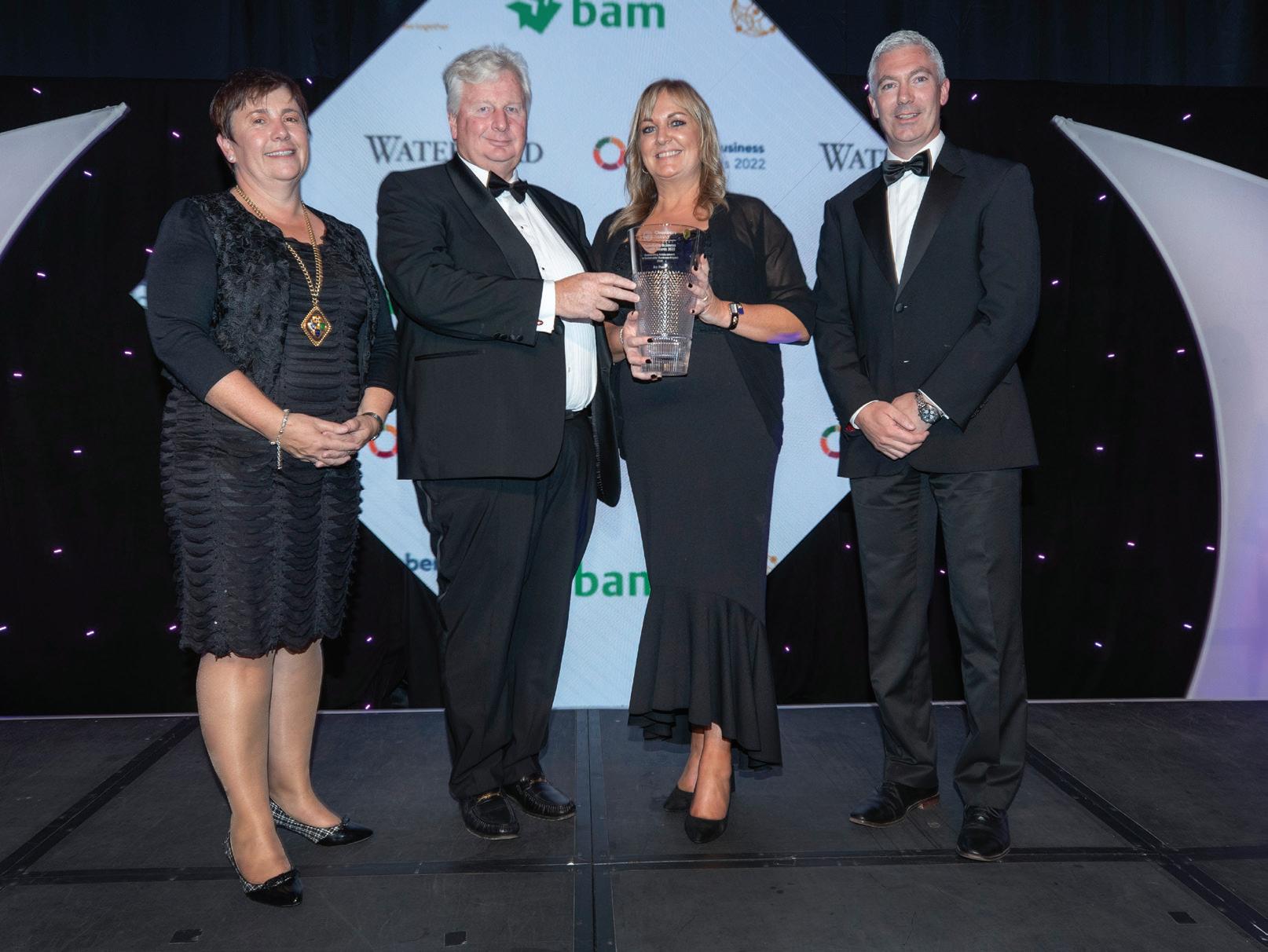
Speaking at the awards ceremony, Ian Talbot, Chief Executive of Chambers Ireland said, “Congratulations to An Post and the winners of the award categories, whom we recognise for their achievements.
“Our awards reveal how the benchmark of quality among projects implemented by businesses
across Ireland continues to be driven upwards.
“The programmes and activities developed by businesses of all sizes continues to evolve every year and have become ever more proactive at addressing current sustainability challenges. Tonight’s winning projects have also demonstrated engagement with the UN’s Sustainable Development Goals, in everything they do.”

This nineteenth annual awards ceremony was kindly sponsored

by BAM Ireland. The Department of Rural and Community Development sponsored the Social Enterprise category and One4all sponsored the Workplace Award. Each winner was presented with a specially commissioned trophy designed by Waterford Crystal.
Commenting on the awards, Alasdair Henderson, Executive Director, BAM Ireland, said, “As a purpose-led business, we want to enhance people’s lives, ensuring that our activities leave a lasting legacy for local communities. It gives us great pleasure to once again sponsor these awards. Congratulations to all the inspirational participants and particularly to An Post on their dedication to work collaboratively to find innovative and sustainable ways to positively impact people and planet.”
Special Recognition Award – Sustaining Business during the Covid-19 pandemic Civil Service Covid Business Support Team with representatives from Departments of Finance; Enterprise, Trade & Employment; Social Protection; Tourism, Culture, Arts, Gaeltacht, Sports and Media; and The Revenue Commissioners
Communication – LIC – Supervalu – Save the Bees
Communication – MNC – Aldi Ireland – Better Everyday
Partnership with Charity – LIC – Trigon Hotels – Trigon Hotels in Partnership with Cope Foundation
Partnership with Charity – MNC – Lidl Ireland – Combatting Period Poverty with Dignity
Excellence in Environment – LIC – An Post – Decarbonisation strategy
Excellence in Environment – MNC – MSD Ireland – See Green, Be Green
Volunteering – Intel Ireland – Volunteering in our communities
Community Programme – LIC – Arthur Cox – Strengthening Access to Justice for Communities through FLAC’s information line Community Programme – MNC – Vodafone Ireland – Hi Digital
Workplace – sponsored by One4All – Brown Thomas Arnotts – Reinventing Retail: Creating a Sustainable Future through Workplace Experience
Social Enterprise – supported by the Department of Rural & Community Development A&L Goodbody – ALG & SEI collaboration to unlock the potential of social enterprise
Diversity & Inclusion – LIC – Bowsy – Diversity Launch Diversity & Inclusion – MNC – Mason, Hayes & Curran – The Engage & Educate Fund 2022


Sustainable Impact by a Small or Medium Business – Jiminy Eco Toys – Inspiring a Playful Sustainable World
Outstanding Achievement in Sustainable Business Impact 2022 – An Post
In addition, Chambers Ireland presented a Special Recognition Award to the Civil Service Covid Business Support Teams, reflecting the enormous contribution made to business sustainability by those civil servants charged with delivering the various government Covid-19 supports to businesses on a timely and efficient basis.
Ian Talbot, Chief Executive of Chambers Ireland, noted,
LIC – Large IndigenousCompany MNC– Multinational Company
“The work of these teams has contributed enormously to the remarkable economic recovery since the end of the worst of the Covid-19 crisis. Without timely and effective deployment of the various government schemes,
companies would have failed in large numbers from a lack of cash flow and countless employees left without any income. We are delighted to take this opportunity to recognise their unprecedented work and commitment.”
“OUR AWARDS REVEAL HOW THE BENCHMARK OF QUALITY AMONG PROJECTS IMPLEMENTED BY BUSINESSES ACROSS IRELAND CONTINUES TO BE DRIVEN UPWARDS
Shortlisted across four categories, An Post was the worthy recipient of the Outstanding Achievement Award at the Sustainable Business Impact Awards.

After being shortlisted across four awards categories in this year’s Sustainable Business Impact Awards, it was An Post that was the very worthy recipient of the Outstanding Achievement Award. An Post earned the Outstanding Achievement Award by demonstrating commitment to sustainability in its company values and consistently meeting key judging criteria across all aspects of sustainability.
An Post’s purpose is ‘to act for the common good and to improve the quality of life in Ireland, now and for generations to come.’ This is the guiding light by which its leaders approach the business and corporate strategy. “We’ve pledged to embed sustainability in everything we do and to challenge ourselves to take big steps to provide leadership nationally, encouraging companies and citizens to feel empowered to do everything they can in their own homes, workplaces and localities,” says Nicola Woods, Chief Transformation Officer, An Post.
According to Woods, “Sustainability is truly at the heart of everything we do across our business and corporate strategy.
As well as progressing our action plan, our focus has been on enabling our employees to understand their role in ensuring a sustainable future, and what they can do in their own lives to make a difference. CSR initiatives whether large scale or localised ‘helping hands’ are governed by our purpose ‘to act for the common good and to improve the quality of life in Ireland, now and for generations to come’.”
With An Post’s Employee Sustainability Campaign, it aims to motivate and inspire colleagues to take positive actions at work and at home to be more sustainable. In 2021, An Post ran an employee survey which indicated that employees wanted to make positive contributions to sustainability in work, at home and in their communities, but that a lack of information was a barrier. Based on that insight, it developed and launched the campaign with external partners Change by Degrees to motivate and inspire employees to take positive practical actions. The year-long campaign focused on monthly themes such as eco-transport, renewable energy, and biodiversity.


An Post also won a category award for Excellence in Environment, for its decarbonisation strategy. An Post is working to improve air quality by decarbonising operations and supporting Ireland’s transition to a low carbon future. SEAI verified an energy saving of 33.4 per cent by end 2020, which is a significant step towards the 2030 net zero target.
As the operators of one of Ireland’s largest vehicle fleets and with over 2m square feet of property under management, the transition to a sustainable fleet and renewable energy is core to An Post’s decarbonisation strategy.
“If ever there was a classic
example of thinking globally but acting locally it is An Post’s decarbonisation strategy. We have been able to change our business, hit our targets, set more ambitious targets for the future, all while delivering real benefits for the communities we serve. Of course, the simple truth here is none of these local targets and benefits could have been achieved without the help and co-operation of our colleagues. We’ve shown what can be achieved by aligning our business with this global movement for change, reaching achievable goals and setting an ambitious course for the future.”

Throughout the pandemic An Post maintained sustainable action in a challenging year, keeping Ireland connected and supporting communities by looking after the vulnerable; supplying essential services; providing support to SMEs; and encouraging children to develop literacy skills. “With more than 10,000 full and part-time staff, our retirees and all our staff families, we have deep roots and powerful connections in every Irish community. Working for the greater good works for business, for communities and for the nation as a whole,” notes Woods.
During the pandemic, it maintained a strong presence in the communities, kept us all connected, delivered 375,623 antigen test kits and provided SME discounts to a total of €2.8m.
For An Post, it is a top priority to ensure employees are healthy and happy, while also
ensuring that services remained operational as they managed an extraordinary increase in parcel volumes during the pandemic.
An Post held webinars and support sessions on financial wellbeing, mental health, resilience and healthy eating.
It also encouraged employees to be active during the Big Step Challenge. To complement its Occupational Health services, An Post introduced an Employee Assistance Programme with a 24/7, 365 days a year confidential
digital platform providing access to advice, information and support on health, financial, wellbeing, and social issues.

Employee safety was guaranteed through enhanced cleaning, the provision of medical grade masks and personal hand sanitiser, work-from-home equipment, one-way systems, 2m distancing, and contactless deliveries. An Post continued monitoring safety KPIs and through its training programmes decreased its Road Traffic Accident Rate.

WE’VE PLEDGED TO EMBED SUSTAINABILITY IN EVERYTHING WE DO AND TO CHALLENGE OURSELVES TO TAKE BIG STEPS TO PROVIDE LEADERSHIP NATIONALLY, ENCOURAGING COMPANIES AND CITIZENS TO FEEL EMPOWERED
Vodafone Ireland was awarded best Community Programme for the Vodafone Foundation’s Hi Digital, digital skills training classes for over-65s, run in partnership with Active Retirement Ireland and ALONE across Digital Hubs and Broadband Connection Points (BCPs) in 26 counties.


To help digitally upskill older people and empower them with the essential tools needed to become digitally independent, Hi Digital offers a suite of online courses as well as in-person classes. The beauty of the


for them. The community groups bring people together and offer a fantastic opportunity to socialise and forge new relationships offline, in the real world.
For Liz Roche, Head of Foundation and Sustainable Business, Vodafone, the need to invest in and develop this programme of digital skills training for older people became very clear, especially during the pandemic: “Ireland has one of the lowest digital literacy levels among older people in the EU, with only 19 per cent of over-65’s having basic digital literacy skills, compared to an EU average of 25 per cent. The pandemic exacerbated the digital divide, as more services and communities suddenly moved online.”
online course is that it can be completed at home, either independently or with help from friends, family or other people in the community. And it can be done at whatever pace suits. Meanwhile the in-person classes are run by peers—already accomplished Hi Digital ambassadors (older people who have already themselves completed the classes) who are delighted to be able to share skills that have been life changing
The free Hi Digital training course covers basic and essential digital skills, which help older people manage everyday things that younger digital natives often take for granted—such as reading the news online or managing their banking. A simple, user friendly online learning platform was created at hidigital.ie to teach basic and essential online skills. There is also a mentor guide for friends and family who want to help a loved one through the training at home.
While the course began with simple essential skills, such as using a smartphone or keeping in touch with family and friends
through email, social media and WhatsApp, Roche says the content is continuously building. Vodafone consulted with experts in the banking sector to produce a module on online banking, an area where older people risk being left behind. Scamming is another important area they want to really focus on educating people on: “The fear and anxiety around that is huge for over-65s. We did focus groups and lots of research around the country when we were developing this, and it came up time and time again. We mention safety and security in every module and reinforce those messages.”
Users can take online classes and also book in to in-person classes through Active Retirement Ireland’s portal at hidigital.activeirl.ie. The classes are free and available to everyone, not just Vodafone customers.
IRELAND HAS ONE OF THE LOWEST DIGITAL LITERACY LEVELS AMONG OLDER PEOPLE IN THE EU, WITH ONLY 19 PER CENT OF OVER-65’S HAVING BASIC DIGITAL LITERACY SKILLSLiz Roche, Head of Foundation and Sustainable Business, Vodafone
SuperValu’s award-winning Save the Bees campaign, in partnership with the All-Ireland Pollinator Plan, is part of a broader strategy to be Ireland’s most sustainable retailer.
to impact the environment of local communities is just phenomenal,” asserts Cremin.
However, the survey results also showed that futureproofing is top of mind for almost half of the committees: “Recruiting new members and younger volunteers is actually one of their biggest priorities, and one of their concerns.”

This is why the Save the Bees campaign was so important to ignite the interest of schoolchildren, and bring them into the sustainability and biodiversity universe.
SuperValu was an award winner in the Communication category (Large Indigenous Company) at the Sustainable Business Impact Awards for its Save the Bees campaign.
Speaking about the award, Maighread Cremin, Community & Sponsorship Manager, Musgrave, says: “It’s a real recognition of the impacts that we are making. At SuperValu, we want to be Ireland’s most sustainable retailer, and we are doing an awful lot in the background to make sure that is happening.”
During the campaign, every primary school received a Save the Bees Pollinator Pack. This pack was co-created with the All-Ireland Pollinator Plan and contains guidebooks, posters, bookmarks, and a wildflower garden-kit with native seeds to allow every school to create their own wildflower patch.
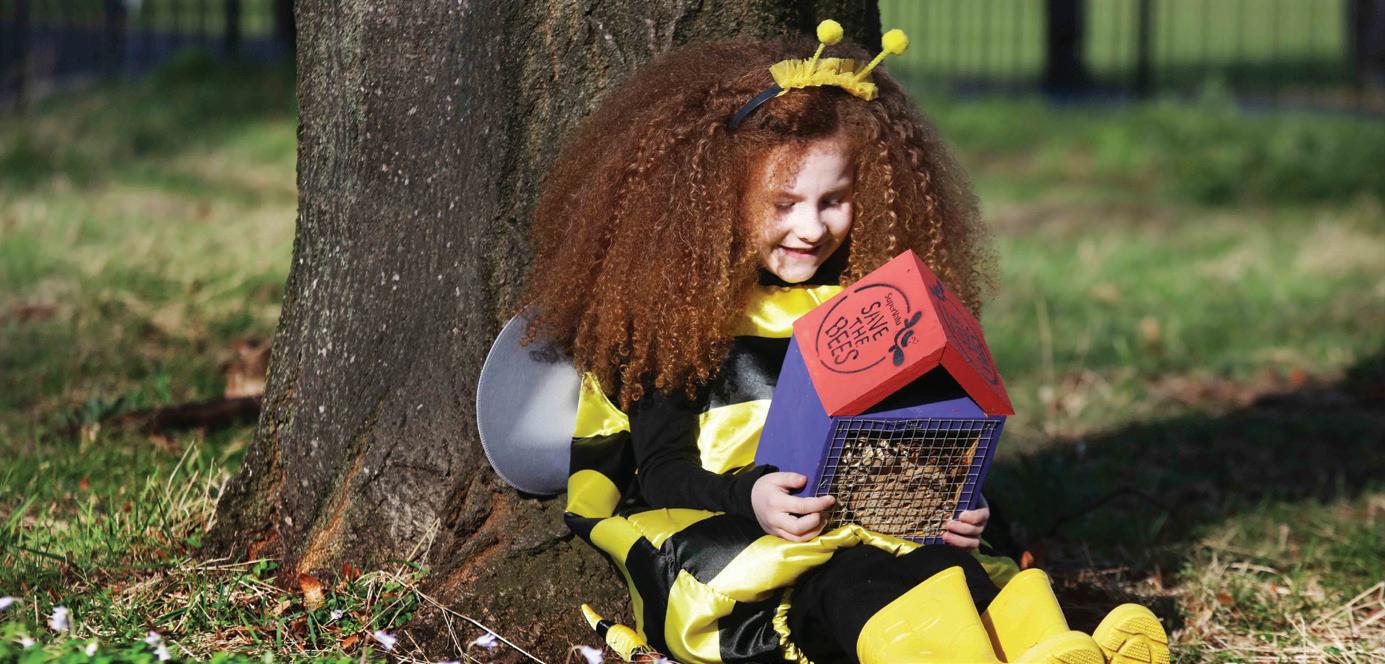
With the launch of the event covered by over 30 news outlets—including the Irish Independent, Irish Times and Agriland—and the social reach from the media drop and social influencer collaborations reaching over 750,000, the campaign brought the issue to the forefront. The Save the Bees TikTok campaign had a reach of over 1 million.
The Save the Bees campaign was also instrumental in introducing children to sustainability and biodiversity issues, which are top of mind across the Tidy Towns network, which SuperValu has been a proud sponsor of for 32 years.
After completing surveys with Tidy Towns committees, it became clear to SuperValu that biodiversity is the number one priority for those 1,000 committees, with 46 per cent listing it as their top priority.
“The opportunity for Tidy Towns
“If we take a step back up to a higher level, our mantra is: we’re committed to building vibrant, sustainable communities. We are signed up to the SDG goals, and we were one of the first retailers internationally signed up to that. Within SuperValu our work on sustainability focuses on the three areas of community, the environment and also being a better business.”
In June of this year Musgrave announced a €25m investment in SuperValu and Centra stores across the island of Ireland as part of a new sustainability fund aimed at empowering retailers to achieve net zero carbon by 2040. The fund, which is part of Musgrave’s all-island sustainability strategy, will result in an estimated 12 per cent carbon reduction by the company over a two-year period.
“By 2040, we want to be carbon neutral in our stores, and that’s something that we’re really passionate about and we are investing in. Initiatives like the Save the Bees Campaign are powerful ways of engaging everyone in the business and in the community around doing things that make a positive impact on the environment.”
It was an unexpected win for start-up Bowsy, in the Diversity & Inclusion category at the Sustainable Business Impact Awards. Bowsy co-founder and CEO John Brady reflects, “It was an incredible recognition. We were very happy to be nominated, and had no expectation that we’d actually win. We were really delighted that we got in the race on that category, with very well established companies there with great initiatives.”
Bowsy’s award-winning Graduate Diversity programme helps small businesses to connect with final year university students from across the country through remote project work. Brady explains: “Many students face different barriers to getting traditional work experience which can vary greatly depending on where a student lives, where they are studying, their socio-economic background or even if their family has access to an employer network. Bowsy helps address this and is focused on providing remote work experience opportunities that are open to all students. This helps them build their CV, address practical skills gaps and create their employer network while they are in their final year of university.”
As part of this strong focus on creating equality of opportunity for Irish students, Bowsy rolled out a Diversity Launch, specifically aimed at larger employers who are trying to improve

the diversity in their graduate recruitment pipeline. Bowsy created a national student ambassador programme to ensure that its platform was representative of the diverse student population across Ireland.
Taking home the title for best in Diversity & Inclusion at the Chambers Ireland Sustainable Business Impact Awards was very meaningful, but even being in the room on the
night was a great boost for a start-up such as Bowsy, opening doors for them. Brady reveals, “Since then, we’ve got a lot of acknowledgment and a lot of companies reaching out to us to congratulate us. We also had some very interesting conversations with some of the other companies that were there that night, in terms of how we could help them with their graduate recruitment programmes and on how we can help improve diversity.”
Having proved the platform in Ireland the company is now expanding into the UK marker in 2023 and the US in 2024. “We signed a three year agreement with a large company in the UK, which gives our business access to 140,000 businesses,” Brady notes. Meanwhile, in the US, success at an Enterprise Ireland pitching event led Bowsy to be selected to join Tech Partners, one of the largest HR tech accelerators in the US. It has also been working with Tulane University on developing the business plan for the US pilot launch.
“We’ve got big global ambitions,” he admits. “Now that we’ve registered in the UK and have that contract in place, the US is next on our horizon. We really want this to be an Irish company that provides a global solution.”


Remote work experience platform Bowsy was a winner in the in the Diversity & Inclusion category for its Graduate Diversity programme opening up work experience opportunities for diverse students.
STUDENTS FACE DIFFERENT BARRIERS TO GETTING TRADITIONAL WORK EXPERIENCE WHICH CAN VARY GREATLY DEPENDING ON WHERE A STUDENT LIVES, WHERE THEY ARE STUDYING, THEIR SOCIO-ECONOMIC BACKGROUNDJohn Brady, CEO and Co-founder of Bowsy, Lorna McMullan, Head of Marketing, and Renata Covisi Pereira, Head of Operations
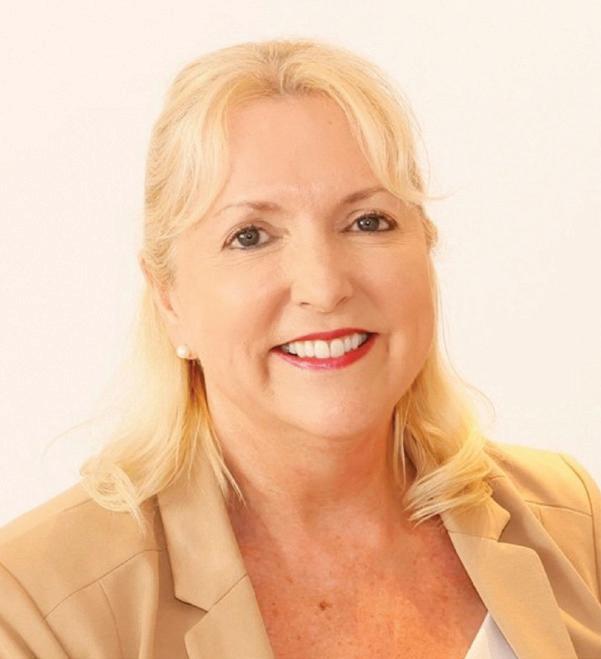
benefits, policies and programmes that support team members.
“We continue to evolve our team experience to ensure that we are supporting an inclusive future for all. We’ve introduced a People Experience Framework featuring supports available to team members at various stages of their life and career journeys, and will introduce detailed Career Frameworks and Academies in the new year to support development and progression,” Sharp says.
Many of the initiatives introduced this year were based on feedback received from employees in BTA’s annual employee survey.
Ultimately, happy employees results in happy customers. With a new store opened in Dundrum in February 2022, BTA is one of the few retailers expanding in bricks and mortar in a challenging sector.
Last year, Brown Thomas Arnotts (BTA) introduced a new Vision, Purpose and Values (VPV) programme and embarked on an ambitious journey to reinvent its team member workplace experience, which was recognised with a win at the recent Sustainable Business Impact Awards.
“We were delighted to receive this fantastic recognition of our workplace initiatives from Chambers Ireland,” states Julie Sharp, People Director, Brown Thomas Arnotts. “The standard of the finalists this year was truly inspiring, and it was an incredible honour to be recognised with this award amongst so many deserving organisations driving positive change for both people and planet.”
To support a sustainable future for its team members, BTA is focusing on a robust Diversity, Equity & Inclusion (DE&I) agenda and prioritising team health and wellbeing through the introduction of new experiences,

In addition, BTA has launched a refreshed Future Leaders Programme as part of the evolution of its workplace experience. These initiatives are aimed at providing clear pathways for talent development and progression in the business.
Sustainability is embedded across all areas of the business and, from new circular services to charity fundraisers, team members are actively engaged in driving positive change for people and planet. “Our purpose is to imagine and create a sustainable future for our
BTA places a focus on ensuring that its policies and practices fit the needs of its team and use demographic data to inform inclusive supports. For example, the recently introduced assisted fertility, pregnancy loss and menopause policies were inspired by its majorityfemale workforce.
It builds on a commitment to provide a supportive, inclusive environment where voices are heard, and everyone belongs. For BTA, incorporating feedback from team members ensures programmes are meaningful and have a long-term impact.
customers and that starts with us,” explains Sharp. “We really believe in taking care of our people. A great customer experience starts with a great people experience, so we’re promoting a culture where talent is developed, and creativity and learning are valued.”
“We are on a journey to reinvent the retail team experience. We look forward to building on the firm foundations we have established as we continue to drive a culture that leverages innovation, inclusion and wellbeing to help our team perform at their best.”
OUR PURPOSE IS TO IMAGINE AND CREATE A SUSTAINABLE FUTURE, AND THAT STARTS WITH US. WE’RE PROMOTING A CULTURE WHERE TALENT IS DEVELOPED AND CREATIVITY AND LEARNING ARE VALUED.Brown Thomas Arnotts believes that a great customer experience starts with a great team experience.

Irish Water is rising to the challenge of climate breakdown and the biodiversity crisis, integrating and embedding sustainability, and significantly improving the sustainability of water services.
Throughout 2021 Irish Water continued to make big strides in improving water and wastewater services, reducing leakage, enhancing the service offered to customers and delivering high levels of connections for housing and development nationwide.

Investment of €851m in capital infrastructure projects during the year delivered major upgrades and construction of new water and wastewater treatment plants and networks, as well as the completion of critical projects such as Cork Lower Harbour and the Vartry Water Treatment Plant. Irish Water also reached a significant milestone with the elimination of 60 per cent of raw sewage discharges in Ireland and is on track to remove most of the remainder by 2025.
Irish Water’s CEO, Niall Gleeson, says: “Irish Water remains committed to ensuring that all our customers have
the delivery of the Government’s Housing for All programme, with over 32,000 offers of new housing connection made.”

Irish Water’s mission is to ensure that all its customers receive a safe, reliable and sustainable supply of drinking water and have their wastewater collected and safely returned to the environment. Its ability to take drinking water from the environment, and return treated wastewater requires a healthy and sustainable functioning ecosystem, fundamentally supported by a diversity of plant and animal life.
Irish Water’s approach supports sustainable development, working with communities across the country, understanding their different needs, and building strong relationships that deliver impactful changes in economic growth, social inclusion and environmental stewardship.
and wastewater assets. The UN SDGs have set an ambitious framework, with water having an individual goal within the SDGs. SDG 6 aims to “ensure availability and sustainable management of water and sanitation for all”.
“Together with our stakeholders, the SDGs will continue to serve as a blueprint for how we behave as a responsible water utility and to focus resources for delivering the most significant and positive sustainability impacts,” states Gleeson.
As one of Ireland’s largest public sector energy consumers, striving to align with the Government’s Climate Action
safe, clean drinking water and that all wastewater is treated and returned safely to the environment. The work we do is essential in order to support economic growth, housing and jobs and in 2021 we continued to support
Irish Water is playing its part in building a more sustainable future by implementing policies and strategies aligned with the UN Sustainable Development Goals (SDGs), taking a proactive approach to sustainability across Ireland’s water
TOGETHER WITH OUR STAKEHOLDERS, THE SDGS WILL CONTINUE TO SERVE AS A BLUEPRINT FOR HOW WE BEHAVE AS A RESPONSIBLE WATER UTILITY
Plan, energy efficiency improvement is a key mitigation measure of Irish Water’s climate change policy. Irish Water’s sustainable energy strategy takes a proactive, business-wide approach including concept design, new projects, retrofits and people.
“In 2021, we made significant progress on the journey to become a low carbon, sustainable water utility, achieving over 34 per cent improvement in energy efficiency performance against a 2009 baseline,
with cumulative savings of 212 GWh primary energy, saving 120,000T carbon,” states Sean Laffey, Director, Asset Management and Sustainability.
“Our strategy and energy management encompasses numerous Energy Action Plans and discrete energy projects, including energy efficient design, innovation, energy retrofits, renewable energy, lighting and heating, energy audits and planning, process optimisation, staff awareness and training.”


Irish Water is implementing Energy Efficient Design (EED) for all new and existing assets in collaboration with the Sustainable Energy Authority of Ireland (SEAI). “Our strategic agreement with SEAI helps to design for energy efficiency from concept, avoiding locking in inefficiencies whilst also helping to transform the industry at a national level,” explains Charlie Coakley, Sustainability Policy Lead.
Irish Water’s significant improvements in energy efficiency delinks its energy use from its carbon emissions; it is at the forefront in installing renewable energy sources, providing a low carbon, renewable and secure energy supply for its assets.
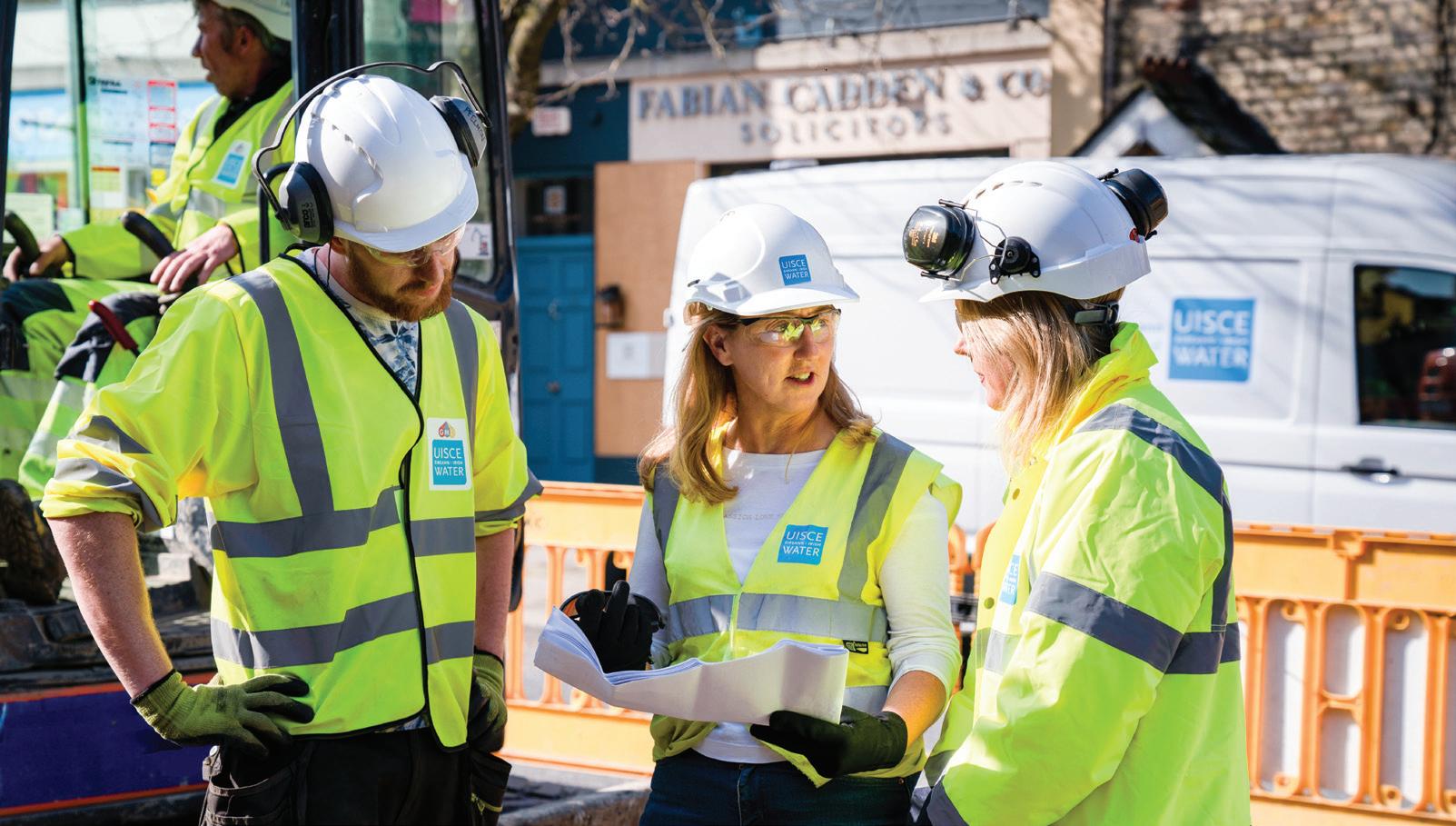
Plans for net zero carbon include further development of solar PV, hydro, wind and biogas across Irish Water’s asset base, which already boasts 20
PV solar sites undergoing statutory planning consultation.
Irish Water continues to progress a number of initiatives taking a circular economy model for the management of sludges (organic matter that has been removed during the water treatment process), which provide a sustainable source of precious finite materials. “Our approach focuses on productive reuse and recycling of sludges as a product, providing an alternative or complement to current raw materials being used, thus entering the circular economy,” says Coakley.
“We view water sludge as a valuable resource particularly in the context of the circular economy model. This model is in direct contrast to the current linear model of ‘take, make, consume, dispose’, with landfill being the primary end point.”
In 2021 Irish Water reached a key milestone with almost 90 per cent of water sludge going to circular economy outlets, from a starting point in 2016 of 70 per cent going to landfill.
“We are well on our way to reach our target of zero waste to landfill by 2030. We have plans to install naturebased solutions, such as innovative sustainable, low-carbon, sludge reed beds and integrated constructed wetlands, at a further 30 sites, biodiversity enhancement on 60 sites and 30 ha of woodland planting in 2022 to help achieve our sustainability target of net positive biodiversity by 2030,” notes Coakley.
Protection of ecosystems is fundamental to Irish Water in order to provide a safe, secure and sustainable water supply. Irish Water’s assets are located within a range of habitats including species-rich grassland, woodland, scrub and wetlands, and its infrastructure interacts directly with freshwater, estuarine and marine habitats through abstraction of water
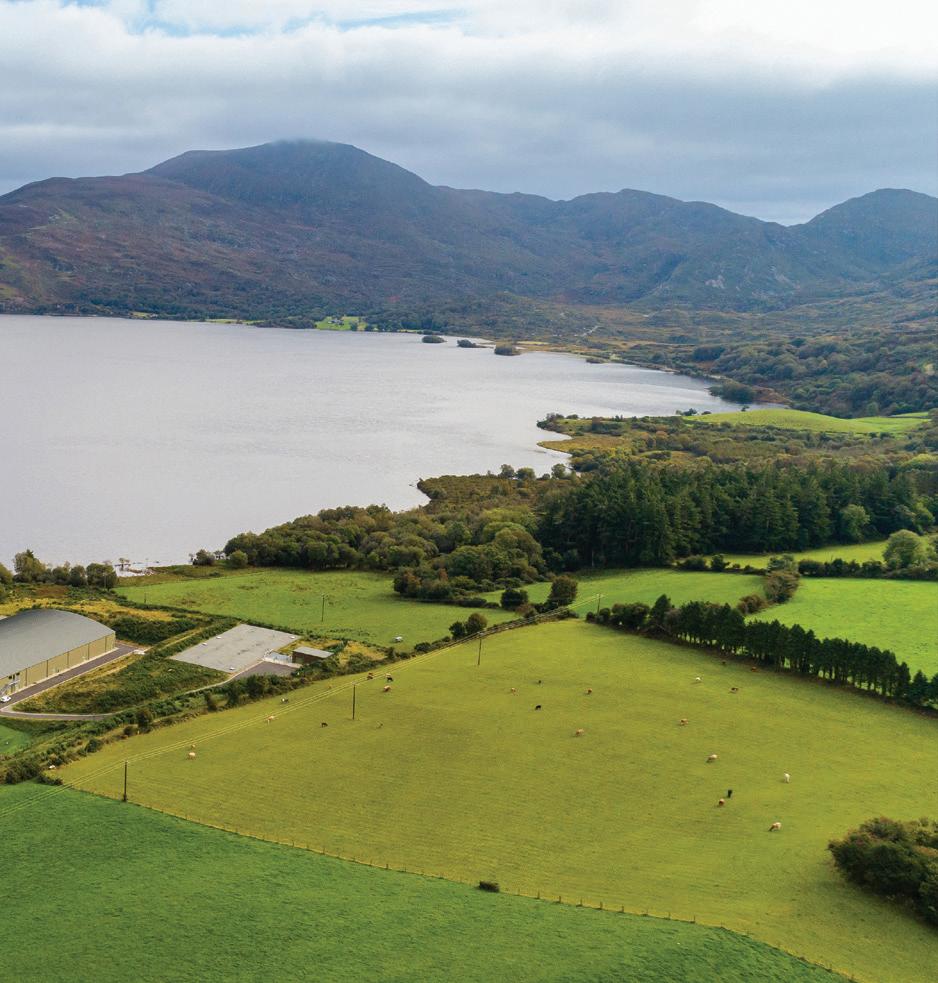
or discharge of wastewater.
To celebrate World Environment Day on Saturday, June 5, 2021, Irish Water launched its Biodiversity Action Plan which sets out a national programme of measures to protect and enhance Ireland’s biodiversity. In 2021, Irish Water planted 18,500 native trees at Lough Guitane in Co Kerry. These trees form a riparian woodland along the shores of Lough Guitane, protecting the source of drinking water for Killarney whilst also providing carbon sequestration. Irish Water also implemented Biodiversity Management Plans and Enhancement Measures for 140 sites nationally.
Water conservation and water stewardship for business is becoming very important in Irish Water’s drive to become a more sustainable nation. It is working in partnership with businesses to safeguard our water supply now and into the future with the Irish Water Certified Water Stewardship Programme providing water stewardship training for business customers.
The innovative programme is the first of its kind globally. It is an


international best practice certification, accredited by the European Water Stewardship Standard (EWS). The initiative is being implemented with the endorsement of key business stakeholder groups including Chambers Ireland, Ibec, IDA Ireland, Origin Green, BIM and Enterprise Ireland.
The specialised training provides business owners with the knowledge and expertise to lower water consumption and reduce operating costs while protecting the environment. Small changes such as identifying water waste on site, setting a baseline for water use, raising awareness amongst staff and customers or upgrading to water efficient devices can help to save water and money. Over 450 water stewards have been trained to date, with over 1,000 new water conservation projects put in place by businesses.
Irish Water partnered with An Taisce on the ‘Think Before You Flush’ awareness campaign about problems caused in our marine environment and wastewater systems by the thousands of unsuitable items that are flushed down toilets every day, causing blockages in our homes and businesses, leading to sewer overflows in our communities and plastic pollution in rivers, beaches and the ocean.
Operated by An Taisce’s Clean Coasts programme in partnership with Irish Water, the campaign is promoted across the country. As part of the 2021 campaign, 5 national events and 30 regional activities were run throughout the year. Many events were modified as a result of the ongoing pandemic, with the majority being delivered online and through social media.
Another important sponsorship for Irish Water is the An Taisce Green Schools programme, which aims to inform tomorrow’s water advocates today. Across Irish Water staff from many functions contribute to the programme, speaking directly to children who are the future engineers, scientists and communicators, teaching them about water as something that needs to be conserved and protected.
In total 269,802 students, 29,185 staff and 752 schools participated in the Water theme last year, with a focus on online and virtual and engagement.
“Sustainability is at the core of everything we do at Irish Water as we progress on our journey to becoming a low carbon, sustainable public water utility,” Gleeson concludes.
“We are committed to the provision of safe, clean water services to a growing economy and population in a sustainable manner, for now and into the future and we aim to enhance and protect the environment while supporting the social and economic development of the communities we operate in.”

OVER 450 WATER STEWARDS HAVE BEEN TRAINED TO DATE, WITH OVER 1,000 NEW WATER CONSERVATION PROJECTS PUT IN PLACE BY BUSINESSESBallymore Eustace Biodiversity
“In terms of the award, it’s always lovely to be recognised, but the substance of this

initiative, to be honest, is more important than any recognition,” states Declan Black, Managing Partner, Mason Hayes & Curran, speaking about the Sustainable Business Impact Award for Diversity & Inclusion. “As a firm, we have put education, particularly for the disadvantaged, at the heart of our programme of giving, for many years now, and the Engage & Educate Fund is one of the pieces of that initiative.”
The Engage & Educate Fund 2022 is a €1.2m fund, created by Rethink Ireland, Mason Hayes & Curran and the Department of Rural and Community Development via the Dormant Accounts Fund, to back innovative projects that empower young people and adults through education, enabling marginalised communities to access gamechanging education programmes.
The fund, established in 2017, aims to work with organisations that break the negative cycle of poverty through education, opening up opportunities to people and assisting them to achieve their full potential and contribute to their communities.
The 2021-2024 fund, supported
by Mason Hayes & Curran, will see the largest ever amounts awarded since the project began, with five organisations receiving grants and non-financial supports packages. Among the successful projects this year are organisations that provide education opportunities to people experiencing marginalisation, young people from the Traveller community, young people with disabilities and people with migrant status.
“We aspire to donate about 1 per cent of our turnover annually; that would have been north of €800,000 euro for 2021,” Black reveals. “Engage & Educate is a big piece, but by no means the sole piece of that. And while I say education for the disadvantaged is the main focus, there are also subsidiary focuses. For example, in response to the crisis in Ukraine, we have engaged substantively with UNICEF.”

Listing the positive attributes of the Engage & Educate programme he notes, “First, it’s a double your money initiative—Rethink Ireland and the Government match our money. Secondly, it’s not just money. It has an advisory and development component to it, so the charities that qualify get a lot of non-financial support, to develop what they do, in addition to the financial support. And then thirdly, there’s an opportunity for our staff to engage with the awardees both in terms of
the selection of them, and then in terms of trying to assist them as they grow. That is a good thing for us because it means that our relationship is better and more rounded.”
Mason Hayes & Curran takes a considered approach of building relationships over the course of multiple years with the recipients of its charitable donations—from disadvantaged schools to the UCD Sutherland Opportunity— resulting in a deep engagement and true impact.
AS A FIRM, WE HAVE PUSHED EDUCATION, PARTICULARLY FOR THE DISADVANTAGED, AT THE HEART OF OUR PROGRAMME OF GIVING, FOR MANY YEARS NOWMason Hayes & Curran has partnered with Rethink Ireland and the Department of Rural and Community Development to back innovative projects that empower young people and adults through education. Declan Black, Managing Partner, Mason Hayes & Curran
Trigon Hotels, in partnership with the Cope Foundation and its Ability@Work service, worked to highlight inclusion and foster lasting relationships.
Trigon Hotels’ awardwinning Partnership with a Charity stemmed from Strategic Director of Human Resources Kathleen Linehan’s experience in working on an accessibility project. The hotel group partnered with Ability@Work, a dedicated supported employment service, run by the Cope Foundation and funded by the Government and the European Social Fund, to provide employment and training opportunities to people that quite often would find employment opportunities challenging.
They also continue to work on a sensory garden which is located beside Root’s Café and the Beech Hill Garden Centre at the Cope Foundation. Over the past number of months both participants from the Cope Foundation’s Bonnington Training Centre and Trigon Hotels have been working on this project.
Trigon Hotels continued to support Ability@Work even through lockdown, by a variety of means, which included taking participants on the hotel group’s induction and getting feedback on how to make it more accessible. This led to a review of workplace practices within the hotel group.
Aaron Mansworth, MD of Trigon Hotels notes, “The aim of this project was to provide employment and training opportunities to people that quite often would find employment opportunities challenging. We also

wanted to become more aware and educated on how best to adapt our practices to make our working environments more inclusive and accessible for all.”


Now the group’s onboarding process, advertising of positions, and training process are all done using easily readable methods and videos. Linehan reveals that plans are in train to put QR codes linking to instructional videos in places where an employee might need some instruction – changing a keg for the bar, for instance.
The sensory garden is now fully up and running, growing produce that is used in the hotel kitchens, which feeds into one of their goals of sourcing more products locally and contributing to decarbonisation.
“Since we’ve launched the sensory garden, our teams continue to go up on the first Tuesday of every month, and we meet with the students from Bonnington Training Centre, and we tend the garden with them,”
says Linehan. The hotels have made use of potatoes, onions and garlic from the garden, and the mint has been a hit with their mixologists.
Linehan reveals she has seen the effect of the sensory garden in action, watching wheelchairbound non-verbal visitors lean in over the beds to smell and take in the scents. Not only that, but visitors to the garden centre beside it often come down to spend time there with a coffee and get to see the work the Bonnington Centre students are doing there. “It’s a lovely place to sit down and relax, and it’s highlighted to the wider community the work that the foundation is doing with students.”
WE ALSO WANTED TO BECOME MORE AWARE AND EDUCATED ON HOW BEST TO ADAPT OUR PRACTICES TO MAKE OUR WORKING ENVIRONMENTS MORE INCLUSIVE AND ACCESSIBLE FOR ALLKathleen Linehan Strategic Director of Human Resources, Trigon Hotels





















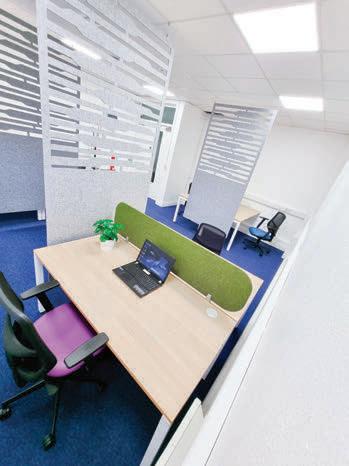

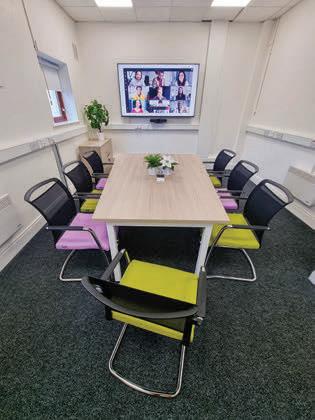








Foremployers acceding to remote working requests, using remote working hubs to run parts of their head office function offers cost savings and the promise of a better work-life balance for staff. Meanwhile, employees cut their commute, stay in local towns and get to enjoy the social aspects of co-working life. The benefits for all are clear, and Government support has underlined the value it sees in it. The network of remote working hubs is growing stronger every day.

The Engine Hubs network is your go-to for remote working facilities across the Mid-West region, with participating hubs in Limerick, Tipperary and North Kerry.

Engine Hubs, the first collaborative cluster of business hubs spanning the Mid-West, is an Innovate Limerick initiative and an excellent example of public-private collaboration. With an existing portfolio of 20 locations across Limerick, Tipperary and Kerry, the network contributes to the overall digital development of multiple small towns and rural areas by maximising the use of existing enterprise centres throughout the region.
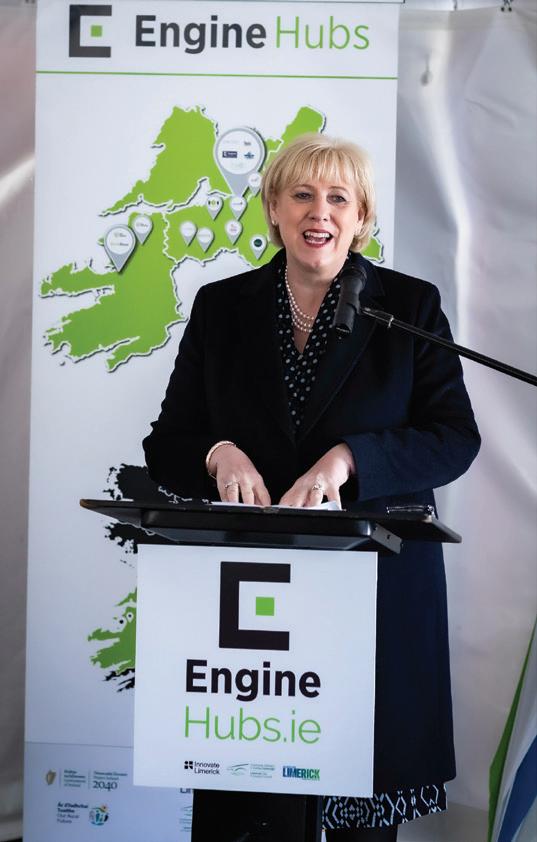
The Engine Hubs network provides a hybrid working infrastructure for remote workers and business owners, as well as
full landing pad services to multinationals looking to set up or expand their operations in the region. Engine Hub is a network of privately and publicly owned co-working spaces that serve businesses and individuals in both urban and rural areas. The network of 20 homegrown hubs work together as one network, serving both rural and urban communities. Each hub has its own unique character and offers move-in and drop-in office space for business owners, start-ups, scale-ups and a growing number of remote workers.
CEO of Innovate Limerick and Head of LEO Limerick, Mike Cantwell, pointed
THE HUBS IN THE ENGINE HUBS NETWORK HAVE COME TOGETHER AS A UNIFIED GROUP, WHILE RETAINING THEIR INDEPENDENCE, TO CREATE AND SHARE IN THE ECONOMIC DEVELOPMENT OF THE MID-WEST
out that Engine Hubs’ overall aim is to strengthen the attractiveness of Ireland Mid-West as the first choice location for living, working and investing, by providing opportunities for the companies to explore, create and facilitate important collaborations.
am confident that the Engine
Hubs network will add greatly to the enterprise development infrastructure of Limerick and the entire Mid-West. The hubs in the Engine Hubs network have come together as a unified group, while retaining their independence, to create and share in the economic development of the Mid-West. They provide quality
workspaces in accessible locations, which is key to the development of the region. The strong working relationships between the members of the Engine Hubs network ensures successful collaboration, and the securing of over €700,000 in Connected Hubs funding is a great example of how we work together.”
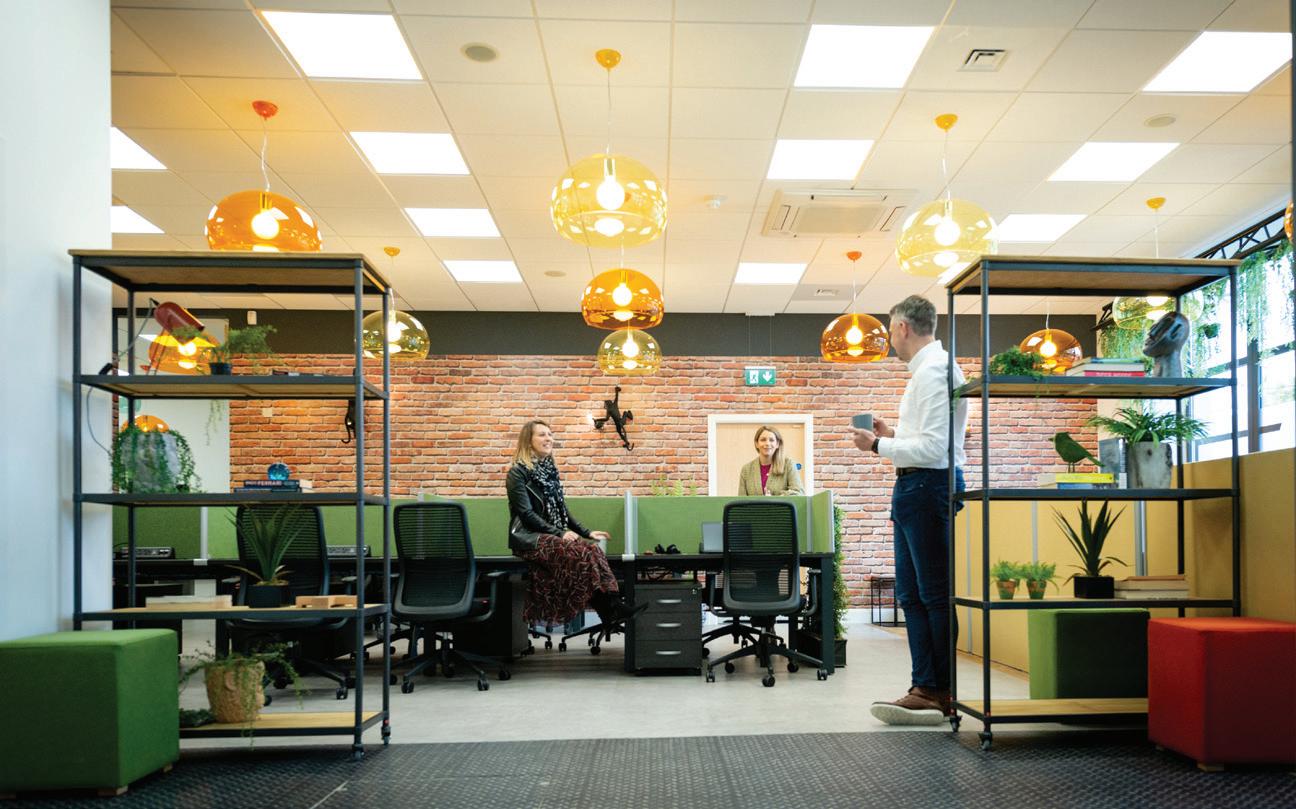
Innovate Limerick plans to expand the network in the coming year with more locations throughout the county and the Mid-West region. Engine Hubs will deliver benefits to each individual hub and its tenants through making a wide range of services available to occupants at a cross-regional level. The hubs network is an integral part of a much greater, connected business ecosystem, the Engine Ecosystem, which aims to help individuals and businesses connect, collaborate, and grow across the region and beyond.
To find out more about Engine Hubs, see enginehubs.ie or to book a space see www.enginehubs.ie








is so much more than














It is an integral part of a much greater, connected

















ecosystem. We call it the Engine





– here to help individuals and businesses connect, collaborate and grow across the region and beyond.























































































SOLAS is developing a range of green skills programmes to ensure employees have the skills to compete in a low carbon, resource efficient, and circular economy.
Climate change and sustainable development are a key focus for Further Education and Training (FET) to harness its strong capabilities in energy, building and the environment in order to make an impactful contribution to the Government’s call to action on climate change. Companies need to ensure that their employees have the right skills to compete in a low carbon, resource efficient, and circular economy.
In response to the ongoing critical challenges that businesses are facing, SOLAS is developing a range of green skills programmes in collaboration with the Education and Training Boards (ETBs) and strategic partners Enterprise Ireland, IDA Ireland, Environmental Protection Agency, Sustainable Energy Authority of Ireland, Irish Water and Regional Skills Fora. These Skills to Advance
programmes include QQI accredited micro-qualifications at Level 5 in the areas of Environmental Sustainability in the Workplace, Lean Practice for Sustainable Business, Resource Efficiency in the Workplace, the Circular Economy, Sustainable Procurement and Greening the Supply Chain. These programmes are of short duration, stackable and will be delivered in a blended learning format incorporating tutor led support and provide access to online digital resources that will enhance and support the learning experience.
Mar y Lyons, Director of Enterprise, Employees and Skills, SOLAS, commented: “The focus on agile upskilling to futureproof our workforce in vulnerable occupations, businesses and sectors and to optimise opportunities in emerging areas, is central to the core mission of the Skills to Advance initiative. Businesses can avail of Skills to Advance development
opportunities that will help their business into the future to develop that agile workforce.”
To ensure all learners participating in FET can develop green skills, a Level 4 Environmental Sustainability Awareness module has been developed and will be rolled out by the ETBs from Autumn 2022.
The Level 5 programmes are being developed under the Skills to Advance initiative and will be delivered by the 16 Education and Training Boards around the country. The initiative supports ETBs in embedding a strategic, consistent, and structured approach to enterprise engagement to meet enterprise and employee skills needs. In the last three years, over 35,000 employees have benefitted from upskilling opportunities provided by their local ETB through Skills to Advance. This initiative assists employers to develop new skills in their teams, improve their cost savings, competitiveness and profitability through highly subsidised training. For employees, Skills to Advance provides upskilling opportunities to develop new skills in emerging areas and futureproof their jobs.
For further information contact your local ETB or visit www.skillstoadvance.ie.
THE FOCUS ON AGILE UPSKILLING TO FUTUREPROOF OUR WORKFORCE IN VULNERABLE OCCUPATIONS, BUSINESSES AND SECTORS AND TO OPTIMISE OPPORTUNITIES IN EMERGING AREAS, IS CENTRAL TO THE CORE MISSION OF THE SKILLS TO ADVANCE INITIATIVE
When we talk to business owners, finance and HR professionals
today, a number of themes seem to recur – inflation is an obvious one but recruitment and retention of key staff are front and centre for many employers. The recruitment consultants are telling us that salary and benefits expectations have risen and that a good pension scheme is considered a decent starting point and not an exception. So if you are to compete to win in the “war for talent”, you know your benefits package must be fit for purpose, must engage and now has to reflect a changing pensions landscape. So there may be some considerations that fall into the “nice to do” category, but there is a burning platform in the “have to do” space whereby ensuring compliance with some pretty substantial legislative changes is something you may need to address very soon.
Many Irish occupational pension schemes are established as single employer trust schemes. By year end, the implementation of the IORP II Directive requires that they must come to terms with pronounced changes and administrative requirements with higher costs associated with them, such as the appointment of key function holders and the requirement for annual audits for all schemes irrespective of size. There are alternative scheme
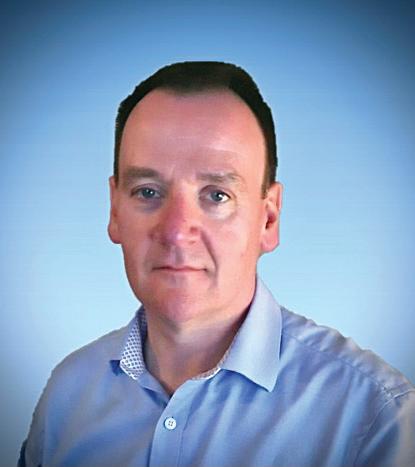
structures that could be considered such as PRSA’s or moving to an umbrella scheme structure via a “master trust.” No matter what you decide, change is inevitable.
Like any change process, the first steps for all parties impacted by this new directive is to understand the changes required, determine their impact, identify the measures already in place to successfully address them and finally come to a decision on how best to go about plugging the gap. This gap analysis is critical in determining the alternative options available that are best suited for the company and its members. This is where consultation and advice is paramount.
With so many changes taking place, members will become aware of new documentation and details within standard communication documents such as their Annual Benefit Statement. It is useful to make them aware of posed changes. This could be a useful opportunity to kick off an exercise to engage scheme members to a greater extent. Our audience research, in conjunction with Red C, shows that people struggle to understand pensions and what they can deliver at retirement. Tax relief confuses many and it can be hard to work out how their money is invested.
Bank of Ireland has partnered with a UK fintech business to introduce a revolutionary member
communication solution to Irish pension schemes which aims to inform and engage scheme members through people-led, leading technology. MyPension365 is an example of how technology can support good quality face-to-face member engagement to help them to understand, appreciate and value the benefits provided to them. Better employee engagement can support companies’ employee retention initiatives.
The clock is ticking, in terms of making decisions regarding your pension scheme to maintain compliance. It is also an opportunity to get good advice on whether or not it is fit for purpose in terms of supporting your recruitment and retention needs. It is an important benefit that’s of real value to members when they’re fully engaged.
Innovative technology can help businesses of any size see benefits, including reducing costs and boosting both customer and employee satisfaction.
To manage your business effectively, it is important to understand its potential for growth. There are multiple ways to grow your business, from raising awareness about your products and services straight through to converting leads on your website. However, while this does require investment, businesses can be clever at using technology to help manage costs. “Every business has factors to consider when managing costs but this does not mean that you have to break your budget to afford the
Great connectivity might not be the first technology that springs to mind when you think of managing costs but it is absolutely essential to ensure a seamless shopping experience for customers, whether its online through an e-commerce platform or in person at the checkout.
“First and foremost, without a reliable broadband connection, the simplicity and speed of contactless transactions disappears,” says Kelly. “It’s back to the old ways of waving a card machine in the air, hoping desperately for a stronger signal as the line of customers grows in front of you.”
It’s not just about speed at the point of sale, however, a reliable broadband connection means that sales can be processed quickly and efficiently, making the process streamlined and simplified for your customer. A reliable broadband connection also applies to guests, ensuring a smooth and seamless journey for everyone.
telephone lines are now a thing of the past and fewer and fewer people use them,” Kelly notes. “Opting for mobile phones, virtual phone lines and VoIP is not only an effective way to reduce costs but it also helps to improve connections and security. Security is always a concern for any business but with modern firewall solutions, you can be sure that cyber-attacks and threats are prevented.”
services you need,” says Emer Kelly, Head of Sales and Marketing, Virgin Media Business. She advises there are two factors that are important to consider when managing costs: using modern technology and keeping employees connected.
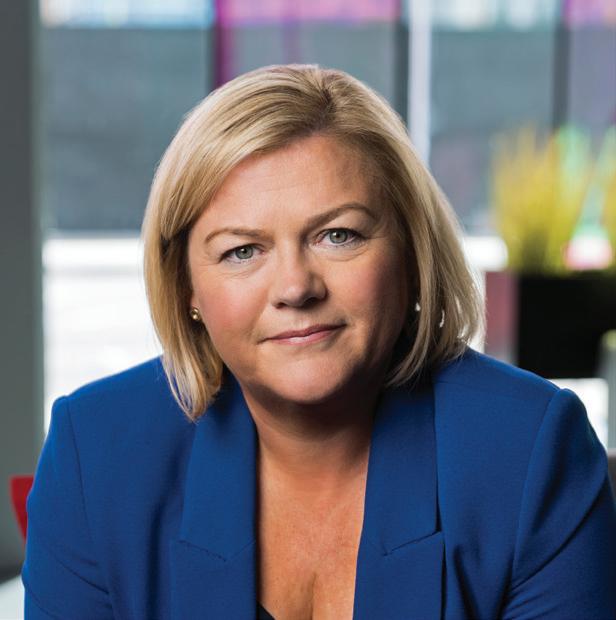
Keeping employees connected is critical to any business. As a large section of the workforce continues to work remotely or as a part of a hybrid working model, businesses now find themselves in need of reinforcing their security infrastructure and opting for cost effective ways of achieving this.
“Traditional landlines and
According to Kelly, even the smallest businesses can get see benefits from implementing technologically innovative solutions. The cost is often only a fraction of the potential value they offer in the long term.
“Building connections in a cost effective, secure and reliable way should be the aim of all businesses. Managing business expenses efficiently and strategically will help to reduce costs, boost both customer and employee satisfaction, along with ensuring overall business security,” Kelly concludes.
TO
BOTH
AND
ALONG WITH ENSURING
At DHL Express our FOCUS Strategy forms
the basis of what we do every day and how we operate across more than 220 countries and territories. Our mission is simple and has remained so throughout the years – ‘Excellence. Simply Delivered.’ In order to achieve this we focus on our three bottom lines, i.e.our aim to be Employer of Choice, Provider of Choice and Investment of Choice.
One of the keys cogs in this wheel is our ambition to be provider of choice in the logistics sector. In order to succeed in our aim we need to have loyal customers, so at DHL we put the customer at the heart of everything that we do.
Every decision that we make is influenced by how it will impact our customers. Customer loyalty is built up over years by developing meaningful relationships with our clients, who know that if something goes wrong they can get through to their local Account Manager or Customer Service team immediately.
Anyone you speak to on the DHL team will be a certified specialist in their area and our Account Managers are trusted advisors that want to see your business succeed and will support you to get there.
This year at DHL Express Ireland we decided that all this wasn’t enough and we wanted to celebrate our loyal customers even more. As a result ‘Love Your Customer Week’ was born. That’s not to say we don’t love our customers
every week, however, from September 26th-30th we put the customer at the heart of everything we did. Our Account Managers were back where they love to be—out on the road calling to customers, but this time with fabulous gifts to surprise customers and show our appreciation for their continued loyalty to DHL.
In addition to this we were delighted to be able to welcome a host of customers to attend Hub Tours in our three hubs across the country in Dublin, Cork and Shannon. These hub tours allowed our customers to see what goes on behind
the scenes and to fully appreciate how amazing and intricate our Big Yellow Machine is. We have enjoyed fantastic partnerships with many of our customers for years so it was truly a great opportunity to show them around our facilities so they can appreciate how much care and attention goes into every shipment. It also gave us the opportunity to finally meet and welcome some of our newest customers that have started working with us since Covid-19. It was a pleasure to put such a focus on our customers this week knowing that the relationships we are cultivating will be long, prosperous partnerships for all involved.

EVERY DECISION THAT WE MAKE IS INFLUENCED BY HOW IT WILL IMPACT OUR CUSTOMERS. CUSTOMER LOYALTY IS BUILT UP OVER YEARS BY DEVELOPING MEANINGFUL RELATIONSHIPS WITH OUR CLIENTS
DHL Express’s FOCUS Strategy is the basis for everything it does and during the recent Love Your Customer Week the focus was its loyal customer base.
ata has no value if you’re not using it,” says Guro Bergan, VP and GM EMEA at Fivetran. e California-headquartered company helps businesses to e ortlessly centralise all their data to improve the accuracy of data-driven decision-making.
“DA recent survey of global data professionals conducted by Fivetran and Dimensional Research found that 34 per cent of data analysts’ time is being wasted on trying to access data, while 68 per cent of analysts say they don’t have time to implement pro tdriving ideas.
On data, she says: “It loses value over time so the more complex it is
to use the data, the longer it takes to get any intelligence or insight from it. We’re certainly seeing an environment in which businesses are aware of the importance of the data they hold, but the challenge they face lies in how they’ve aggregated these many sources of data over time – in some cases many, many years. at presents a huge challenge because
all the databases are different, they can’t connect them or sometimes even extract the data.”
According to Bergan, the value in Fivetran’s proposition lies in continuously synchronising data from source applications, driving the use of the data, and freeing up data teams to focus on higher value tasks.
“Data teams are seeing a lot of investment. But are companies challenging themselves to ask, ‘What decisions is that actually helping us make?’”
Typically, data teams are getting bogged down in extracting data from bespoke pipelines and the real value isn’t being extracted by focusing on gaining the competitive insights that data can offer.
“In a few years’ time the CFO might turn to the chief data officer and ask, ‘What’s going on here? I’ve spent millions of dollars with your data team, your infrastructure, your architecture – but
all you’re doing is reporting or data visualisation.’ The ROI simply isn’t there,” Bergan explains.
“There’s so much data out there about customers, employees, the companies you work with, vendors –all of that data is wonderful, but only if you get value out of it.”
Getting the right integration processes in place is essential for any kind of digital or data
transformation, Bergan advises.

“Anything a company does is usually for one or more of three key reasons: to reduce cost, to reduce risk or to increase revenue. In this instance, it’s a relatively simple thought process that starts with something along the lines of ‘how do we reduce the cost of data engineers because we’re spending too much to maintain these pipelines?’.
“As soon as you begin automating processes by using a solution like ours you no longer have to have engineers working every connector – and to put that saving into context, I was recently speaking with a customer of ours who explained that for each of the Fivetran connectors they use, they would have previously had to have up to four engineers to build that same connector,” she says. “Then they have to maintain it afterwards and, to compound the complexity, if those engineers who have built and maintained the connector
pain points by pulling all data sources into one central location and providing customers with the ability to analyse it.
“It’s about trying to remove those silos because you can’t get anything done when the data is in lots of different locations,” says Bergan. “It’s making it simple and easy to get to that intelligence, to get the information you need. And also making it reliable so you know that the data is always up-to-date, accurate and consistent.”
Nandos restaurant chain and Condé Nast publishing house are just two companies that have seen the benefits of working with Fivetran to improve their data workflows and free up their data teams to work on higher value tasks.
“Think about the value you could unlock if you move the dial from only 3 per cent of data in use to 15 per cent or 20 per cent or 25 per cent. There’s a huge amount of value that sits in that,” says Bergan.
“It’s a data democratisation journey, not a data democratisation day trip. It’s not something that you do in a few minutes or a few days. This is a one- or two-year programme of work.
leave the business there’s no one who knows how it was built or to step in should it break. With us, it’s more automation and essentially a plug-and-play solution depending on complexity, so it saves businesses from having significant volumes of technical debt and lets them get the most from their data.”
Fivetran’s mission is to make data simple and reliable, removing
“Having access to all this data used to be something that only really large corporations with a lot of cash flow were able to invest in,” says Bergan. “Now it is so much faster and easier – we’re actually democratising it for companies. That means smaller companies which don’t have access to that same investment are able to access the data, become more agile and see the same advantages as the enterprise.
“Organisations unlock their purpose when they have better access to data. It means they can do better, grow faster. It enables them to achieve all the key priorities they need to move forward.”
For more information visit www.fivetran.com
HAVING ACCESS TO ALL THIS DATA USED TO BE SOMETHING THAT ONLY REALLY LARGE CORPORATIONS WITH A LOT OF CASH FLOW WERE ABLE TO INVEST IN. NOW IT IS SO MUCH FASTER AND EASIER – WE’RE ACTUALLY DEMOCRATISING IT FOR COMPANIESGuro Bergan, VP and GM EMEA, Fivetran

can be tailored with a personalised video message from you on behalf of your business or customised with a photo of your company logo; easily sent by text or email.

Recent research* carried out by One4all echoes how the cost of living is top of mind in the Irish psyche. Results show 55% of people said they are highly impacted with the rising costs of living with 53% worried they won’t be able to pay for gas, oil, or electricity bills.
Terry Spence, Director of Sales for One4all Rewards, says, “Our latest research highlights the serious impact of the current economic climate on employees and, it also presents a huge opportunity

for employers to reduce their own costs by utilising the BIK exemption.”








Business owners can now gi an employee up to €1,000 tax-free a er Finance Minister Paschal Donohoe revealed in Budget 2023 that the BIK limit would be increasing from €500 to €1,000. Businesses can now reward employees up to €1,000 per annum in One4all Gi Cards, free of tax, PRSI and USC charges, saving up to €1,313.54.
e One4all Gi Card can be loaded from €15 to €150 and its digital counterpart




For higher value loads over €150, the One4all Chip & PIN option is available in physical or digital reloadable format. Gi cards over €150 currently require photo veri cation to help protect Irish consumers against online fraud. If employees already received one of these cards last year, their photo veri cation is valid for up to four years from date of validation.
For more information, email corpsales@one4all.ie or visit www.one4allrewards.ie to place your order today.
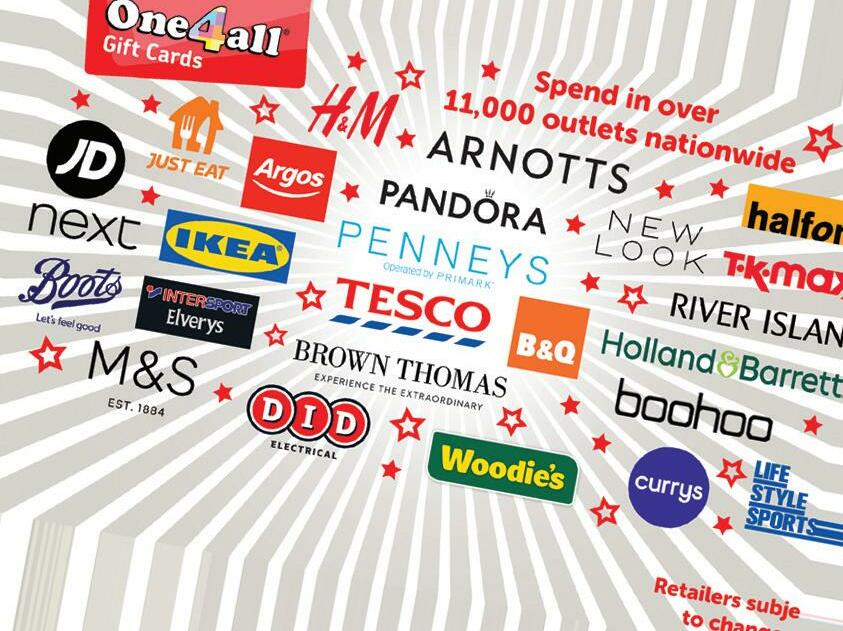
*So urce: Blackhawk Network research carried out with a panel of 1007 participants aged 18-65 in June/2022.

As a business owner, you can now gift an employee up to €1,000 tax-free after Budget 2023 increased the Benefit in Kind limit.
To improve your chances of making a successful credit application, you need to present your case well to your bank, so that they understand your business. The easiest way to do this is to have a simple business plan which includes both trading records showing what your business trading was like pre-Covid and during Covid, along with credible cash flow projections for your business going forward.
If your business changed substantially during Covid, your business plan should
address these changes. In addition, you may have to unwind any special concessions made during the pandemic and demonstrate how your business can afford to do that – as well as meeting current commitments. For example, if you negotiated rent concessions from your landlord that will have to be paid back as well as paying current rent due.
Similarly, if your business warehoused its tax debts, you will be required to enter into a Phased Payment Agreement (PPA) with Revenue – effectively agreeing a threeto-five-year repayment plan at 3% interest. You should engage with Revenue early to ensure you get a deal that works for you and your business.
You may have legacy debt that was required to weather the Covid period –repayments will impact your cashflow going
forward and your ability to repay the bank you are now seeking finance from. The bank will want you to show that you can make all repayments comfortably. More detailed information is available in the information note ‘How to Apply for a Loan’ which can be found at www.creditreview.ie in the ‘Resources’ section.
If you are refused business credit by your bank, or have your existing facilities reduced or withdrawn, Credit Review can help you to appeal this decision. Set up by the Minister for Finance in 2010, Credit Review’s mission is to ensure viable SMEs and farms access the bank finance they need for their businesses.
For more information on our independent appeals process, visit www.creditreview.ie or call 0818-211789
Having trouble getting a business loan from your bank?
Have your credit facilities been reduced or declined?
Credit Review is here to help.
Call our helpline on 0818 711 289 or visit creditreview.ie
Credit Review is helping to ensure viable SMEs get access to bank credit.









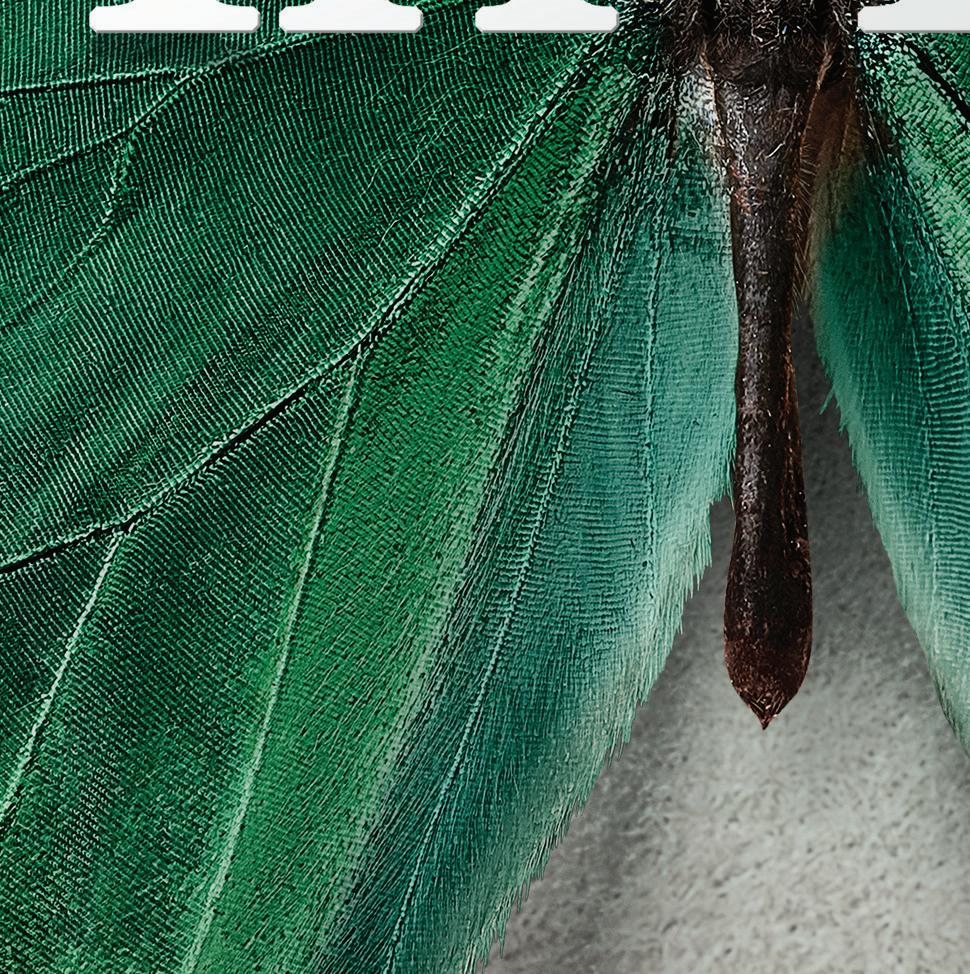

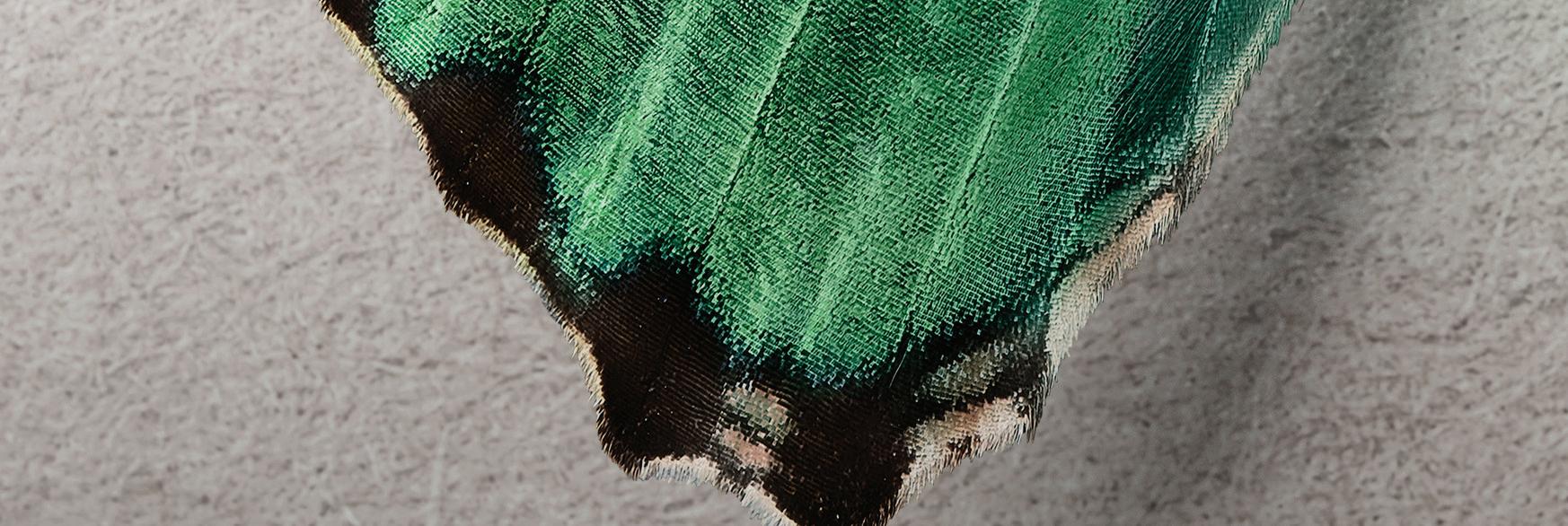









Balbriggan Harbour improvements commence, Swords due new Cultural Quarter and Civic and Cultural Centre, €150k awarded to Fingal for cross-border project, and sod turned on new Bettystown Library


Limerick conference highlights importance of addressing biodiversity, €10m awarded to protect Cork coastal areas, Kanturk gets a new 332-metre walkway, and Cork’s Water-Rock development begins
Climate Action & Sustainability Strategy for Mayo’s MacHale Park launched, Sligo gets new outdoor dining area while Community Archaeology Project gets underway, and Leitrim gets €213k CLÁR funding

Buncrana’s Swan Park reopens, Regeneration Strategy and Action Plan announced for Dungloe Town Centre, 100% electric passenger ferry unveiled in Belfast, and Cavan community projects get €160k







The Royal Sites of Ireland are a group of six unique collectives of largely prehistoric monuments and sites associated in early medieval and medieval texts as the principal ancient sites of royal inauguration in Ireland. Spread throughout the island, four of the sites represent the ancient Kingdoms of Ireland and its current provinces of North (Emain Macha), South (Rock of Cashel), East (Dún Ailline) and West (Rathcroghan). Tara was the seat of the High Kings of Ireland situated in the ancient “fifth” province of Meath (Midhe) while the Hill of Uisneach the “omphalos” or centre was where the five kingdoms met.
The respective Local Authorities of Armagh City, Banbridge and Craigavon, Tipperary, Kildare, Roscommon, Meath and Westmeath have been working together for many years to develop the Royal Sites of Ireland case for “outstanding universal value” which is the key attribute for World Heritage Sites. An application to the new Tentative List was made in June 2021. In line with UNESCO guidelines, a site must first be on its State’s Tentative List before it can be considered eligible to move forward with a bid for World Heritage status. The addition of the Royal Sites to the Tentative List is the first step in a long process towards the achievement of World Heritage Site status.

The iconic Great Hall at Malahide Castle has reopened following significant works to the historic building that have helped restore one of finest Medieval Banqueting Halls in the country. Dating back to 1475, the Great Hall was redesigned in the 1820s by the 2nd Baron Talbot of Malahide in the neo-gothic style. Over €500,000 was invested by Fingal County Council to carry out the restoration.
 [ COUNTY MEATH ]
[ COUNTY MEATH ]

Taoiseach Micheál Martin announced a €150,000 grant under the Shared Island Local Authority Development Funding Scheme for the Corridor Enterprise Hubs project, a Dublin Belfast Economic Corridor (DBEC) initiative for which Fingal County Council is the lead authority. DBEC is a partnership of eight local authorities and two universities located on either side of the border. The grant will enable Fingal County Council to commission a feasibility study on developing regional innovation hubs within the DBEC area.
of Meath County Council, Cllr Nick Killian; Minister of State for the Gaeltacht and Sport, Jack Chambers; Minister for Justice & Equality, Helen McEntee; and Chief Executive Jackie Maguire turned the sod to officially mark the commencement of work on the €4m Linear Walkway and Playing Fields Rooske Road, Dunboyne.

The site will be developed as part of the government’s Large Scale Sport Infrastructure Fund (LSSIF) to provide a linear walkway, sports playing fields, changing facilities and a car park that will consist of 98 parking spaces. The linear pedestrian walkway will link Rooske Road with Dunboyne Main Street/Maynooth Road via the existing public park. The pedestrian walkway is proposed to run alongside the Castle Stream and to cross the stream by reinstalling the old William Turner Bridge, which was removed during flood alleviation works in 2012. The walkway will incorporate outdoor exercise equipment along its length.
Playing fields will consist of three junior playing fields and an all-weather pitch. A building adjacent to the car park will include changing facilities, a meeting room, an office and storage area.
Work to upgrade and enhance the facilities and amenities of Balbriggan Harbour will start this autumn once feedback has been received from harbour users in Ireland’s youngest town. Funding for the project – which is expected to be completed early in 2023 – includes €289,000 from the Department of Agriculture, Food and the Marine.
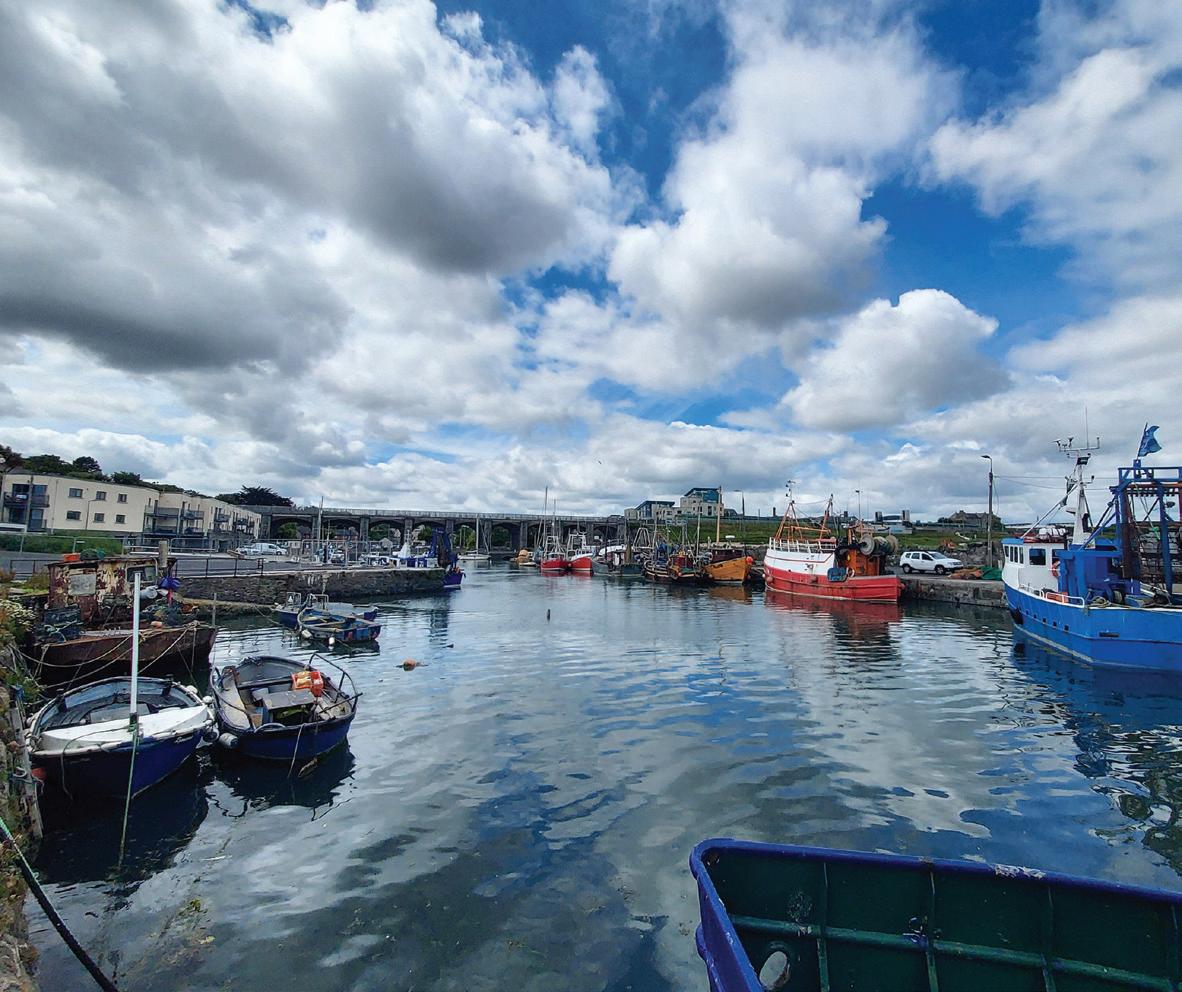

The Mayor of Fingal, Cllr Howard Mahony, says: “It will be great to see the improvement works to harbour facilities in Balbriggan taking place, and this will contribute enormously to the overall redevelopment of Quay Street and environs.”
John Quinlivan, Director of Economic, Enterprise, Tourism & Cultural Development at Fingal County Council, explained that Malachy Walsh and Partners Engineers have been engaged by the Council to carry out the upgrade. Future regeneration of the harbour will help to create a lively pier and waterfront area that will open up greater tourism opportunities for the town and see more food and leisure amenities in place as a result.
A sod-turning ceremony to mark the start of the works on Bettystown Library was led by Cathaoirleach of Meath County Council, Cllr Nick Killian; Minister of State for European Affairs, Thomas Byrne TD; Cathaoirleach of Laytown/Bettystown MD, Cllr Wayne Harding; and Chief Executive of Meath County Council Jackie Maguire.
The development will bring a library service back to East Meath for the first time since the mid-2000s. Laytown library was the first purpose-built branch in the county back in 1957 and the new library will deliver a whole new set of firsts to the residents of Laytown, Bettystown and Mornington. The new development will have the first sensory room in the county, the first library to offer users free access to the latest in 3D technology and the first library to offer group study pods to students.
The 1,134 square-metre library will be located in a landmark building with stunning views out over the sea and a major community meeting space overlooking a new plaza in the centre of the village. Three multifunctional meeting spaces will allow the library service to deliver a wide variety of events and activities for children and adults, while the community and voluntary sector will also be able to book the meeting spaces for free.
Fingal County Council councillors agreed to designate a 3.89-acre area in Swords around the junction of North Street, Seatown Road, Bridge Street and Main Street for a Cultural Quarter and granted permission for the construction of a Civic and Cultural Centre as well as other works associated with the overall development of the Cultural Quarter. The Civic and Cultural Centre building, which has been designed by O’Donnell + Tuomey Architects, will include a new 3,000m2 County Library, art gallery and exhibition space, café, civic area, studios and rehearsal rooms, and a Black Box theatre which can cater for audiences of between 165 and 360 depending on the type of event being staged.

Sod is turned on new state-ofthe-art Library in Bettystown
Atwo-day international conference hosted by Limerick City and County Council focused on how local authorities can help to address the biodiversity emergency Ireland is facing. Over 200 delegates attended the conference at the Limerick Strand Hotel and heard from different experts how biodiversity in Ireland has suffered a serious decline in recent decades with the result that almost a quarter of all species are threatened with extinction.
Mayor of the City and County of Limerick, Cllr Francis Foley with staff of Limerick City and County Council
Case studies for Europe were presented which showcased examples of where concerted actions by local authorities, often working in collaboration with local communities, were able to address biodiversity issues to create a more diverse, healthy living environment. The delegates highlighted the need for local authorities and other public bodies to take the challenge of addressing biodiversity loss more seriously, and incorporate biodiversity targets in all aspects of their work.
The conference was organised by Limerick City and County Council in partnership with the National Biodiversity Data Centre and was due to be held in 2020 during Limerick’s designation as European Green Leaf City.
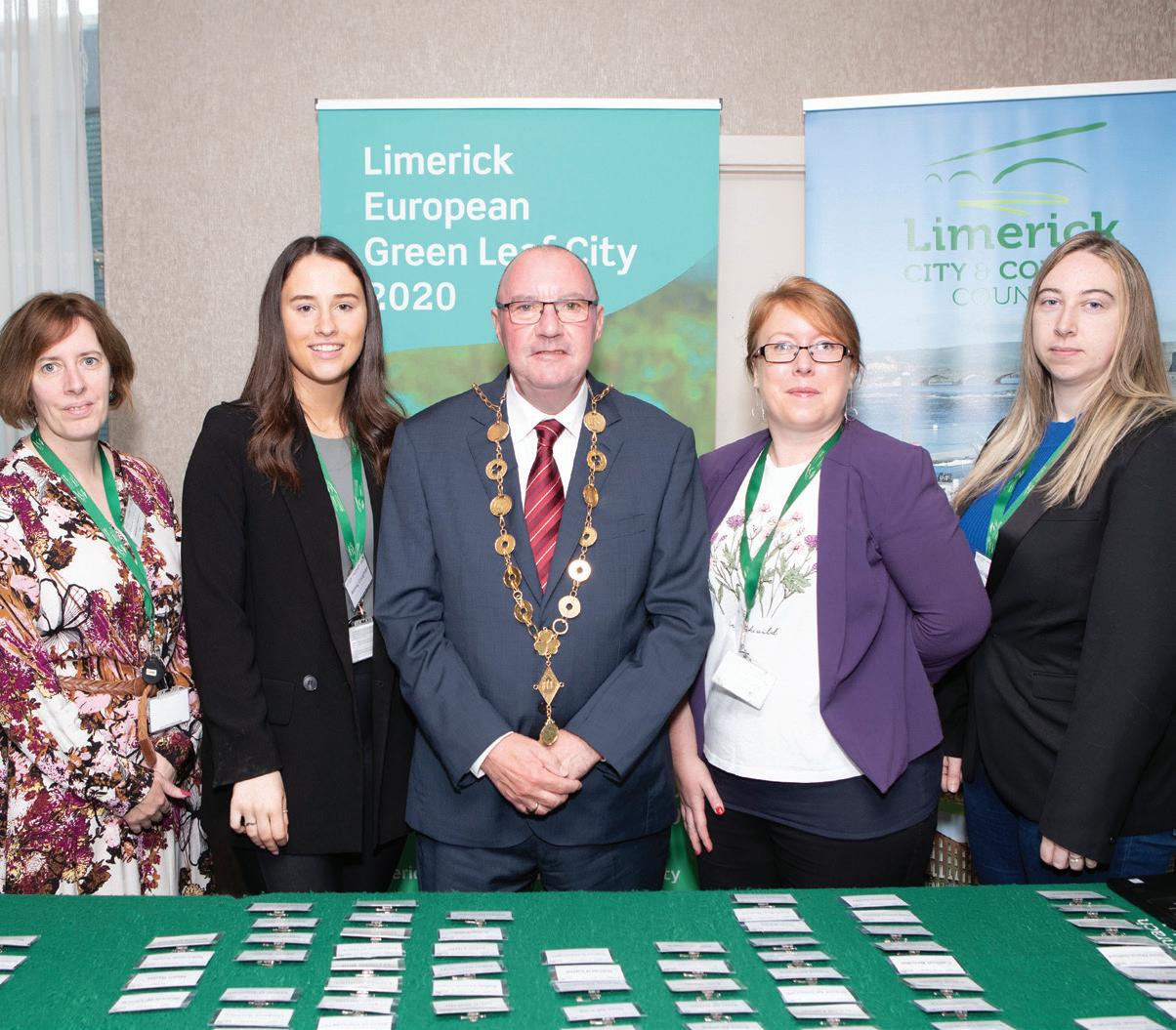
The emerging fourth National Biodiversity Action Plan will include ambitions for local authorities with regard to biodiversity, and the appointment of Biodiversity Officers within each local authority will assist the process.

Cork County Council and the MaREI Research Centre in collaboration with European and British partners have been awarded €10m to develop the methodology for employing nature-based systems to boost our resilience to climate change and mitigate its impacts in coastal areas. This four-year-long Horizon Europe project, called A-AAGORA, will be implemented with the support of the Atlantic Seaboard South Climate
Pictured at the launch of the Limerick Women’s Caucus are Mayor of the City and County of Limerick Cllr Francis Foley with Limerick Councillors, Olivia O’Sullivan, Elena Secas, Sharon Benson, Brigid Teefy, Bridie Collins, Sasa Novak Uí Chonchúir and Sarah Kiely. The caucus aims to increase the numbers of women who participate in politics and comprises the nine women councillors on Limerick City and County Council, coming together in a non-partisan way to address the issues encountered by women in the sector and help support others who might like to enter into political life.
Adaptation Regional Office in collaboration with partners from Germany, France, Portugal, Norway, Finland, Romania and the UK.

Kanturk Castle Walkway is the latest addition to Kanturk town, complementing the new library, town park playground, link road and fire station. The €212,900, 332-metre walkway was funded by Cork County Council and the Department of Rural and Community Development under the Town and Village Renewal Scheme and the Town and Village Accelerate Measure. The walkway forms a vital element of connectivity for the town, fostering community wellness, allowing safe pedestrian movement on the locally established 5km suburban looped route known as “Jacko’s Loop”, access to the renowned tourist attraction Kanturk Castle and safe access into the town’s centre.
Mayor of the County of Cork, Cllr Danny Collins; Darragh O’Brien TD, Minister for Housing; Local Government and Heritage; and Director of Infrastructure Delivery for Irish Water, Brian Sheehan have turned the sod signalling the start of the new Water-Rock development as part of the LIHAF Initiative Infrastructure Works near Midleton, Co Cork. LIHAF, the Government’s Local Infrastructure Housing Activation Fund, provides critical infrastructure aimed at delivering housing in key development sites in urban areas of high demand. Water Rock has been identified as a Major Urban Housing Development Site as part of the County Metropolitan Planned Urban Expansion. The site, consisting of 160 hectares, has been zoned to provide a mixed-use development in
three phases which will eventually include 2,500 residential units, three schools, a neighbourhood centre, railway station and parks.
Cork County Council has worked proactively over an extended period with landowners, government agencies and the Department of Housing, Local Government and Heritage using LIHAF funding to deliver this substantial infrastructure project, providing new roads and services valued at €8.5m,” says Chief Executive of Cork County Council Tim Lucey.




Macroom’s new fire station has been officially opened by the Mayor of the County of Cork, Cllr Danny Collins and Minister for Housing, Local Government and Heritage, Darragh O’Brien TD. Located on Gurteenroe Road next to Macroom’s new Garda Station, it will allow easy access to the new bypass to a service which responds to approximately 150 incidents per year including house fires, road traffic collisions, chimney fires as well as gorse, hill and grass fires. The new station will be staffed by a local crew of 10, which includes a station officer, sub-station officer, driver mechanic and seven firefighters.
Sustainability was a key driver in the development of the station. Cork County Council is an AllIreland Pollinator Plan Partner and in line with the All-Ireland Pollinator Plan, the grassed areas around the fire station will be managed to support wildlife and pollinators. Rainwater will be harvested and stored in a large attenuation tank in the drill yard for training purposes. Renewable energy was integrated into the design with PV panels to provide sustainable energy and to offset carbon emissions. An air source heat pump was specified for both hot water and space heating, further reducing energy requirements.

Mitchels and the Mayo County Board have launched their Climate Action & Sustainability Strategy for the MacHale Park Campus in Castlebar. The aim of the partnership is to enhance and develop the combined campus into a centre of sustainability and to broaden the positive influence of the GAA beyond the physical benefits accrued by those who play competitive Gaelic Games. Speaking at the launch, Mary Prenty, Training and Development Officer of the Mayo County Board, said that “the partnership capitalises on the leadership roles both organisations have within their communities and the potential they have to engage with people of all ages to promote sustainable local development, environmental awareness and climate action”. The partnership has also secured a pilot energy programme and has become a Sustainable Energy Community (SEC). This SEC will be a potential vehicle for the MacHale Park GAA Sustainability Campus and indeed all clubs in Mayo to address energy needs. The SEC intends to engage clubs and members to promote and support sustainable energy use in clubs and members’ homes. The development of the strategy was supported by the Connacht Centre of Excellence, Mayo County Council, club members and stakeholders to devise a common vision to create a resilient and environmentally-sustainable campus through leadership, example and mobilising action at club and county level.
Members of Mayo County Council attended the launch of Castlebar Park and Stride Team at Castlebar Primary School. This scheme means leaving the car about 10 minutes’ walk from the school gate, and making the last leg of the journey to school on foot. For parents or grandparents doing the walk to and from the car, that’s 15-20 minutes towards the recommended 30 minutes of physical exercise we should all be doing every day. Mayo County Council is working in partnership with An Taisce Green-Schools and schools in Castlebar to seek support for this scheme.
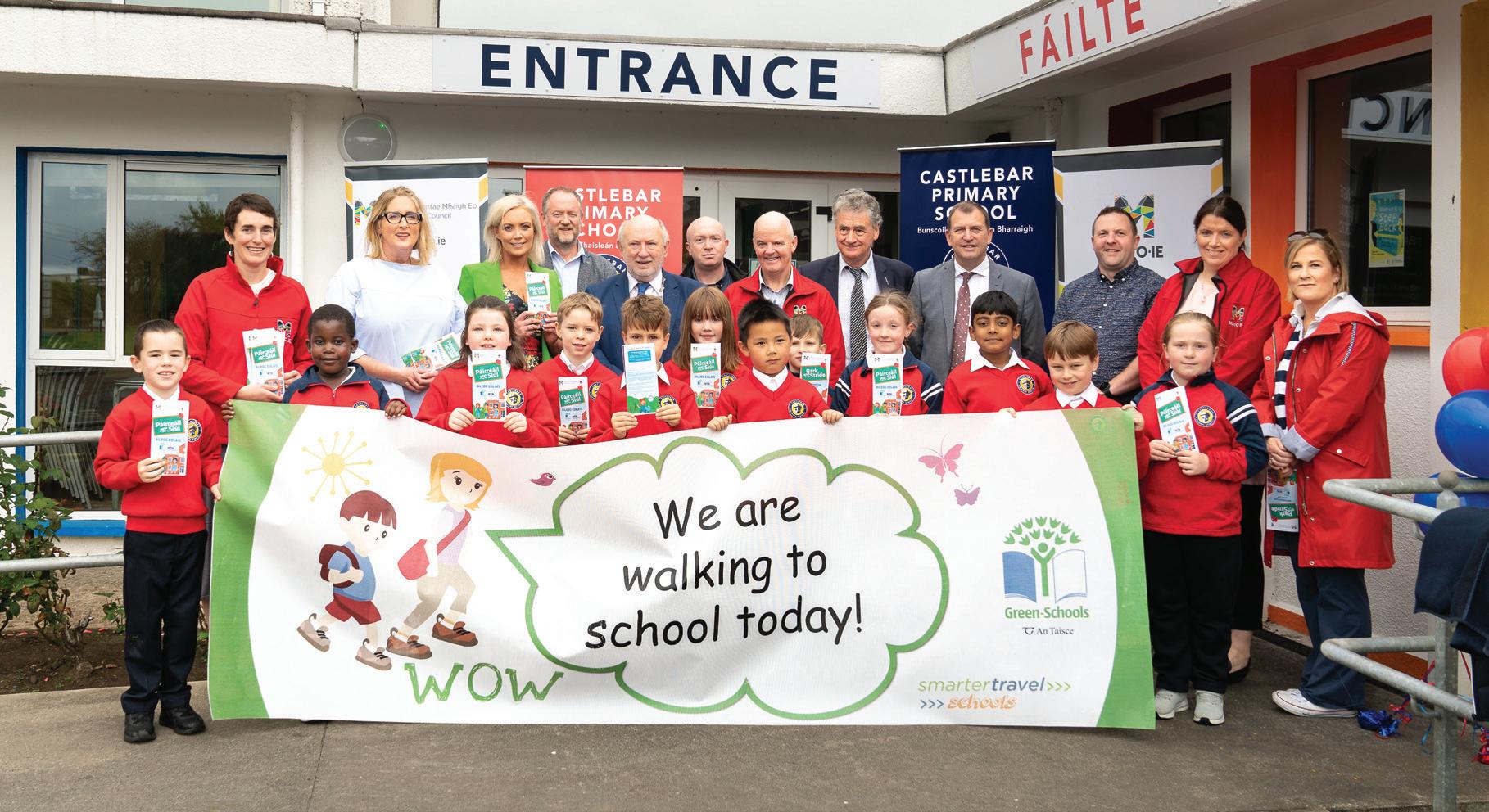
Minister for Rural and Community Development, Heather Humphreys TD, has announced over €2.75m in funding to support 74 community projects nationwide, five of which are in Leitrim with a total fund allocation to the county of €213,671. Under the CLÁR Programme, sports clubs, schools and community groups will receive grants of up to €50,000.

Sligo has an exceptional wealth of archaeological monuments spread throughout the county, from mounds and tombs to castles and medieval churches. The archaeology of Sligo dates from earliest times to the present day and includes approximately 6,500 known sites which are located throughout the countryside. Landowners, including farmers, developers, public bodies, and the general public are the custodians of this heritage resource.
The Sligo Community Archaeology Project is an initiative of Sligo Heritage Forum and action of the County Sligo Heritage Plan. The project is a partnership between Sligo County Council and the Heritage Council and supported by the Heritage Council under the County Heritage Plan Funding 2022.
For 2022, the Sligo Community Archaeology Project is being
delivered by Angela Wallace and Nick Fitch of Atlantic Archaeology on behalf of the Heritage Office, Sligo County Council.
During 2022, the Sligo Community Archaeology Project will focus on promoting awareness, knowledge and understanding of the local archaeological resource among individuals and community groups in the county; promoting heritage best practice in relation to researching and undertaking works relating to archaeological monuments; and strengthening a strategic approach to community archaeology in County Sligo, through working with key stakeholders on specific themes.


Above: Promontory Fort at Aughris, West Sligo.
Below: Archaeologists Nick Fitch and Angela Wallace of Atlantic Archaeology are delivering the Sligo Community Archaeology Project 2022 on behalf of the Heritage Office, Sligo County Council.

Mayor of Borough District of Sligo Municipal District, Councillor Tom MacSharry officially opened the Fáilte Ireland-funded Tobergal Lane Outdoor Dining Area. In attendance were Fáilte Ireland Manager Eva Costello, Chief Executive of Sligo County Council Martin Lydon and Director of Service Dorothy Clarke, Sligo BID CEO Gail McGibbon, Mehron Kirk, Director BDP (designers), Thomas Crummy from TC Landscapers and relevant SCC staff who worked on the project as well as members of the business community and Fox Contracts.
Funding for the scheme was provided by Fáilte Ireland under the Outdoor Dining Enhancement Investment Scheme 2021 and its purpose was to create an all-year-round outdoor dining area. The completed scheme consists of canopies, screens and 105 fully-planted and brightly-coloured pots of varying sizes which line the laneway and enfold each of the participating businesses.
Fáilte Ireland introduced this fund in order to facilitate greater capacity in outdoor dining by supporting local authorities and hospitality businesses to upgrade and enhance streets and public spaces to facilitate year-round outdoor dining.


Minister for Rural and Community Development, Heather Humphreys TD, accompanied by Cllr Liam Blaney, Cathaoirleach Donegal County Council, officially reopened Swan Park in Buncrana. Swan Park was extensively damaged in the devasting floods that occurred in the Inishowen Peninsula in August 2017. In November 2018, the project to redevelop the park was awarded €1.7m through the Rural Regeneration Fund with €500,000 in co-funding being provided by Donegal County Council.
The design team for the park included local architects, engineers and surveyors who went to great lengths with the steering group to ensure that the park was accessible for persons of all abilities. A number of fishing stands have been developed for wheelchair users and other elements have been incorporated for those that may be visually impaired. The redeveloped park also includes an additional area of 3.5 hectares that increases the opportunity for the park to be used for a wide variety of community events and activities.
Swan Park is named after Harry Percival Swan who was born in Buncrana in 1879. Harry was a founding member of the County Donegal Historical Society, a keen promoter of local history and prolific author. A bust of Harry Swan has been erected in the park in his memory and to acknowledge his contribution to Buncrana, Inishowen and Donegal.
Elected representatives, council officials, and members of Donegal County Fire Service gathered at Letterkenny Fire Station to mark the official handing over of the new stateof-the-art Scania Class B fire engine to Letterkenny Fire Brigade by Cathaoirleach Cllr Liam Blaney. The new fire engine, which costs in the region of €450k, is fully funded by the Department of Housing, Local Government and Heritage. Pictured at the unveiling and blessing of the new fire engine are Cllr Liam Blaney, Cathaoirleach of Donegal County Council handing over the keys of the new fire engine to Station Officer Eddy Moore, Letterkenny Fire Brigade. Also pictured: Cllr Donal Coyle; Cllr Donal Mandy Kelly, Mayor of Letterkenny-Milford MD; John McLaughlin, Chief Executive of Donegal County Council; Cllr Kevin Bradley; Joseph McTaggart, Chief Fire Officer; and Garry Martin, Director of Economic Development, Emergency Services and Information Systems. Photo by Brian McDaid.
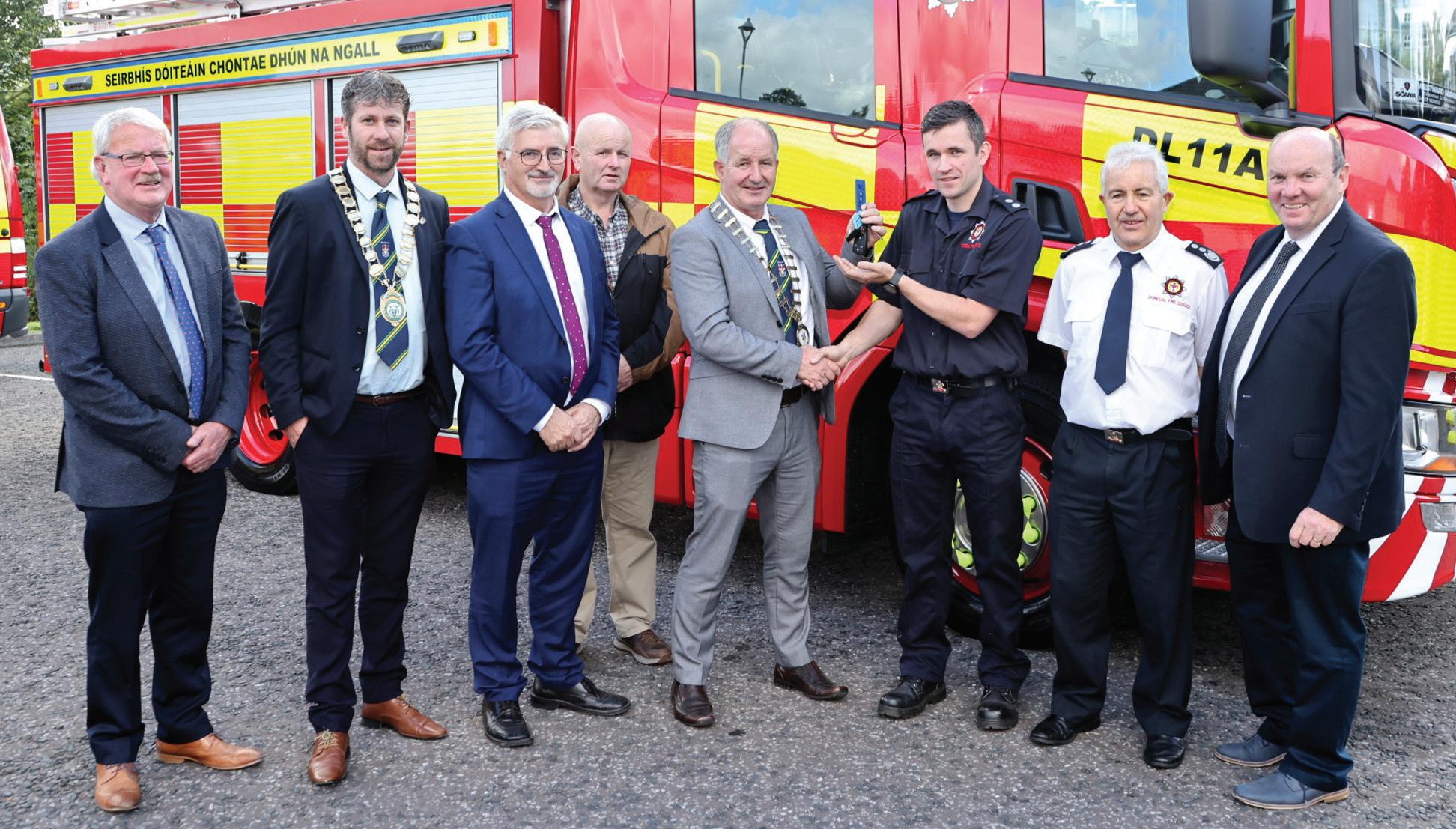

Donegal County Council in conjunction with GM Design Associates has announced the publication of an ambitious and creative Regeneration Strategy and Action Plan for An Clochán Liath (Dungloe) Town Centre. The Regeneration Strategy and Action Plan identifies a number of key actions for the town centre spread across four principal themes, including a series of streetscape enhancements to Main Street, the conservation of the townscape character and the enhancement of town centre buildings, improved connections between Main Street, the bay and the river, the transformation of the waterfront and pier areas and improvements to gateways and signage. A number of actions have
been developed to preliminary concept design stage such as the improvement of the junction of Main Street and Cranmore Road, the transformation of the Waterfront area to a key waterside civic space, the re-imagining of Dungloe Bridge as a focal feature of the town centre, and the provision of enhanced play and recreational facilities.


Leading maritime design and applied technologies company Artemis Technologies has unveiled the design of its new 100% electric EF-24 Passenger vessel, targeting the global highspeed ferry market. This revolutionary ferry is among several zero-emission vessels being developed by Artemis Technologies in Belfast, designed to provide commercially-viable green transport solutions for operators, cities and governments across the world.
With a top speed of 38 knots, the EF-24 Passenger ferry produces fuel savings of up to 85% compared to conventional high-speed diesel ferries. Powered by the patented Artemis eFoiler® electric propulsion system, the 24m vessels will fly above the water, providing a comfortable ride for up to 150 passengers, mitigating effects of seasickness and producing minimal wake at high-speed, significantly reducing the impact on shorelines.
The vessels will feature a unique high-speed collision avoidance system developed with ECIT, part of Queen’s University Belfast, ensuring the safety of operations in port and close to shore.
Artemis Technologies has partnered with Condor Ferries to operate a pilot scheme using the first EF-24 Passenger ferry. This will come into service in 2024, running between Belfast and Bangor.
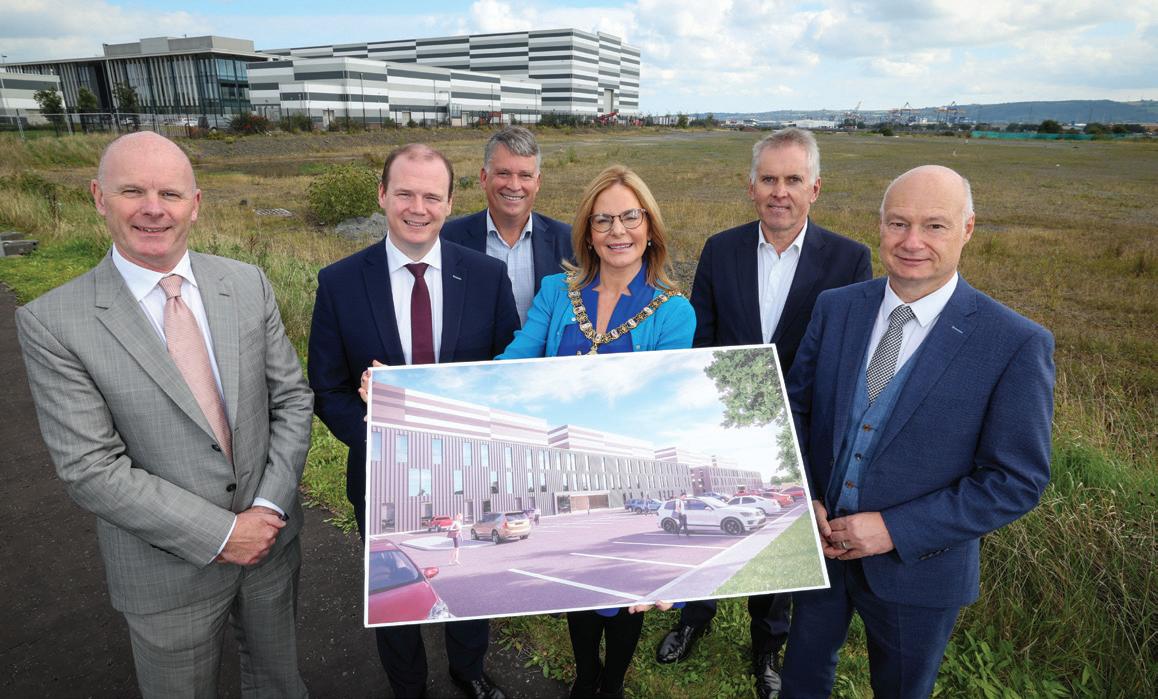
A £25.2m Belfast Region City Deal investment in Studio Ulster, a cutting-edge virtual production studio, has been announced. Situated at Giant’s Park, Belfast, and developed by Ulster University in partnership with Belfast Harbour and supported by Northern Ireland Screen, Studio Ulster will be a unique, largescale virtual production studio complex with world-class commercial stages, supported by an integrated R&D centre of excellence for real-time and virtual production.
Studio Ulster will strengthen Northern Ireland’s status as a prime filming location by offering a nexus of the region’s core strengths in film, broadcast, animation, games and immersive technologies in one central location. A multi-million-pound investment by Belfast Harbour will create a 57,000 square foot building, housing two large-scale virtual production stages with in-camera visual effects stage, a motion capture stage, a 3D scanning stage for full body, facial and object scanning and an R&D smart stage with virtual production technologies to support research. It will support 461 direct and indirect jobs in the screen sector. The facility is expected to be fully operational and open for filming from early 2024.
Donegal County Council in partnership with Derry City and Strabane District Council is advancing two greenway projects as part of the wider North West Greenway Network (NWGN). The projects are being funded under the EU’s INTERREG programme, administered by Special EU Programmes Body (SEUPB). Both projects, the 5km Muff to Quigley’s Point Greenway and the 7.5km Lifford to Castlefin Greenway, are scheduled to go to construction in 2023 and will provide a segregated shared cycling/walking facility and a comfort strip separating the greenway from hedges and boundaries.

Minister for Rural and Community Development, Heather Humphreys TD has announced over €2.75m in funding under the CLÁR Programme to support 74 community projects nationwide, including four County Cavan projects, located at Brackley Lake, Lough MacNean, Mullahoran GFC, and Ballymachugh GAA and Sheelin Park, which will receive combined funding of €162,638.










looks at the latest books o ering insights for executives, budding entrepreneurs, and other professionals, seeking to acquire business skills and knowledge.
AUTHOR: Matthew Campbell & Kit Chellel PUBLISHER: Atlantic Books AVAILABLE: easons.com
The 21st century has brought a powerful tide of geopolitical, economic and democratic shocks. Their fallout has led central banks to create over $25tr of new money, brought about a new age of geopolitical competition, destabilised the Middle East, ruptured the EU and exposed old political fault lines in the US. Disorder: Hard Times in the 21st Century is a long history of this present political moment. It recounts three histories - one about geopolitics, one about the world economy and one about western democracies - and
explains how in the years of political disorder prior to the pandemic the disruption in each became one big story. It shows how much of this turbulence originated in problems generated by fossil-fuel energies, and it explains why as the green transition takes place the long-standing predicaments energy invariably shapes will remain in place.
PUBLISHER: Farrar, Straus and Giroux
AVAILABLE: easons.com
Created from more than 40 hours of intimate conversations with Seán O’Hagan, this is a profoundly thoughtful exploration, in Nick Cave’s own words, of what really drives his life and creativity. The book examines questions of faith, art, music, freedom, grief and love. It draws candidly on Cave’s life, from his early childhood to the present day, his loves, his work ethic and his dramatic transformation in recent years.

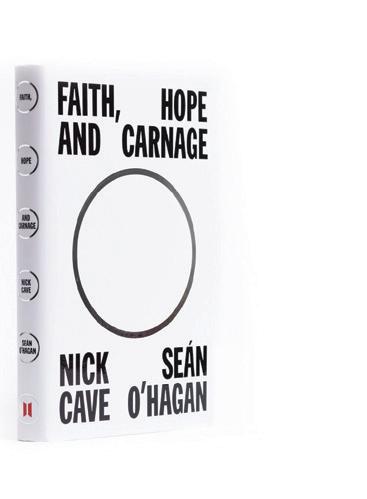

Inside the corrupt and secret business of global shipping, this is the explosive true story of a notorious international fraud and murder. In July 2011, the oil tanker Brillante Virtuoso was drifting through the treacherous Gulf of Aden when a crew of pirates attacked and set her ablaze in a devastating explosion. But when David Mockett, a maritime surveyor working for Lloyd’s of London, inspected the damaged vessel, he was left with more questions than answers. Soon after his inspection, he was murdered. Dead in the Water is a shocking exposé of the criminal inner-workings of international shipping, an old-world industry at the backbone of our global economy. Through first-hand accounts of those who lived through the hijacking - from members of the ship’s crew and witnesses to the attacks, to the ex-London detectives turned private investigators seeking to solve Mockett’s murderaward-winning reporters Matthew Campbell and Kit Chellel piece together the astounding truth behind one of the most brazen financial frauds in history.
AUTHOR: Daniel H PinkPUBLISHER:

An epic account of the decades-long battle to control what has emerged as the world’s most critical resource—microchip technology—with the US and China increasingly in conflict. Economic historian Chris Miller explains how the semiconductor came to play a critical role in modern life and how the US became dominant in chip design and manufacturing and applied this technology to military systems. Illuminating, timely, and fascinating, Chip War shows that, to make sense of the current state of politics, economics and technology, we must first understand the vital role played by chips.

InBUSINESS SPOKE WITH CONALL Ó MÓRÁIN, HOST OF THE THAT GREAT BUSINESS SHOW PODCAST, ABOUT INSIGHTS AND TIPS FOR SETTING UP A BUSINESS AND SUPPORTING IRISH BUSINESSES
ACROSS THE LOCAL AND GLOBAL MARKETPLACE.
Could you tell us about That Great Business Show and why you created this podcast?
I have been commenting on business for decades, first with RTE and on The Sunday Business Show at Today FM. In 2018, Today FM took the decision to take The Sunday Business Show off the air. In 2020, That Great Business Show, hosted by myself and rugby legend Jamie Heaslip was born to ‘do business differently’.
What is the message/goal of the That Great Business Show podcast?
That Great Business Show is unashamedly pro-business.
We discuss business issues at length whilst remaining light-hearted. We want everyone to think about setting up a business for themselves and the insights and tips from our guests are there to help at the early stages.
That Great Business Show podcast highlights all that is great in Irish business. What do you think makes Irish business stand out?
We do a number of things. We highlight women in business (53% of all our interviewees are women) and the number of women setting up their own businesses keeps growing. More generally, the Irish attitude to business is strictly ‘can do’ and I’m always thrilled when I hear of the global ambitions of Irish founders.
How important is it for Irish businesses to support each other across the local and global marketplace?
This is a subject dear to my heart. We repeat, repeat and repeat on the podcast that you need a mentor in business. The only caveat is ‘don’t eat their lunch’.
What is the best career advice you have received? When I was in stockbroking I was taught that you ‘can’t job backwards’. Never dwell on shoulda/ woulda/coulda. Think about it. Do it. Live with it.
Conall O MOrAinWhat, in your opinion, is the first step your listeners can take to succeed in business?
Do something that you’re passionate about (making biscuits or designing buildings, whatever). That means your heart and soul goes into what you do.
What can we expect from That Great Business Show in the future?
We’ll eventually go on to videocasts (a bit messy for edits –we record ‘as live’ so never edit as it gives a different feel to the podcast).
I’m also looking forward to bringing the podcast on a roadshow around the country.
In this podcast series, Doireann Garrihy delves into the beauty of having a laugh, speaking to guests from all walks of life and bringing out the best in some of Ireland’s most influential people.
The Guardian reporter Sirin Kale investigates the story of Matthew Hardy, a cyberstalker who wreaked havoc across the internet and ruined people’s lives for more than a decade.
THE BUSINESS PICK INSIDE BUSINESS WITH CIARAN HANCOCK
Take on Tomorrow brings together leading experts from around the globe to figure out what business could and should be doing to tackle the greatest challenges facing the world; from privacy to climate change to crypto.



























